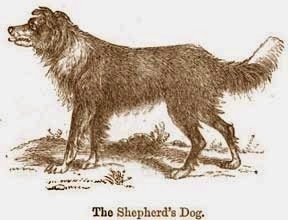Susan Price's Blog: Susan Price's Nennius Blog, page 10
October 10, 2014
Five Gadgets That I Love
1) Sat Nav - Like many other writers, I have driven all over the country, in search of
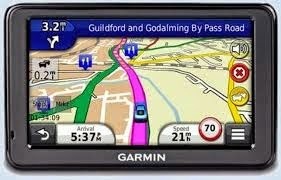 Sat-Navschools in the back streets of towns I've never visited before, and libraries ditto.
Sat-Navschools in the back streets of towns I've never visited before, and libraries ditto.
So I love my Sat-Nav. It saves me all that, 'Am I on the right road? Should I turn round? Should I stop and check the map?' It saves me squinting at tiny, tiny print in A-Zs (though they remain arguably the most useful books ever printed.)
The Institute of Advanced Driving frowns severely on anything that distracts from driving. So I've permanently silenced the CD player and radio in my car - and I would never dream of using a mobile phone, even a no-hands one, while I was driving anyway. But when it comes to my Sat-Nav, I don't care. I will not give up my Sat-Nav.
I argue that, by sparing me all the fret and worry about whether I'm on the right road, it enables me to concentrate more on driving, and makes me a better driver.
 Kindle Fire
Kindle Fire
2) Kindle Fire or other tablet. From the moment I first used an e-reader, I was hooked. Yes, books are beautiful objects. I have been a fan of books all my life. I didn't expect to like e-readers - but now, I don't care, I hardly ever pick up a paper book.
Even though I live in the West Midlands, it's not an area rich in those cosy little bookshops we keep being told about, with a choice selection of books, and informed, helpful staff. In days past, I would have to travel to Birmingham, and when I got there, the book I wanted was - it was almost guaranteed - not in stock. I could order it, of course - and in 6-8 weeks they would notify me that it was going to take longer.
Whereas Amazon, for all its many sins, can be almost guaranteed to have any book I want in stock - and very likely as an ebook, which will be cheaper, and will zip to me through the ether in seconds. Remember a book while you're lying in bed at 12-30 at night, and about two minutes later, you're reading it.
But quite apart from that, I prefer reading an e-book. You don't have to grip a tightly bound, heavy book, and hold the pages open by main force. The number of times a paper book has sprung shut and lost my place! - An ebook always opens at the right place. You can mark places, and the bookmark never falls out.
And more - I can check emails on my Kindle Fire. I can play games and music on it. I can look at my photos. I can (using Docs to Go) write on it and then email my writing to myself. And, having read the Game of Thrones books on it, I then watched the series on my Kindle Fire.
When I had to stay away from home recently, I not only had reading material and documents on my Fire, but downloaded films and programmes. So I sat in my B&B, eating the biscuits, and watching 'Brave' (which I enjoyed no end, especially the prim queen transformed into a bear.)
As I write this, my Fire is within reach. It always is. I carry it about the house with me. I take it to bed with me. When I leave the house, it goes with me, in my bag. I love it.
(3) Yogurt Maker. This is certainly one of the most used
 gadgets in my house. I get through a lot of plain yoghurt, and buying it in the supermarket was expensive, and meant I was always running out unexpectedly.
gadgets in my house. I get through a lot of plain yoghurt, and buying it in the supermarket was expensive, and meant I was always running out unexpectedly.
A friend, learning that I was thinking of buying a yoghurt maker, told me that I didn't need to buy a gadget. She explained how her mother made yoghurt, by wrapping a bowl of milk in blankets and putting it in the airing cupboard. But I don't have an airing cupboard. "Well, use a hot-water bottle and a duvet," my friend said.
It all seemed a lot of trouble if you haven't been raised to it. So I bought the famous Lakeland Yoghurt Maker for twenty quid. Two or three times a week, I put into it 2-3 spoonfuls of live yoghurt from my last batch, pour on a litre of full-fat long-life milk, switch it on - and leave it for 8 hours.
At the end of that time, I have a litre of plain yoghurt, with no added sugar and no preservatives.
Once it's made, you can, if you like, add any flavourings you want - fruit, ginger, cinnamon - marmite, if you want. But put aside the yoghurt to make the next batch first, because the flavouring might upset the bacteria that make the yoghurt.
Every two months or so, when my yoghurt is getting thin, I buy a small pot of live, plain yoghurt, and use that to make the next batch.
(4) Digital cameras. Need I say more? Easy to use, and no
 more buying film, and then having to pay for it to be developed. Whether you want to take arty, atmospheric shots of mountains and clouds, photos of a family birthday party, or close-ups of flowers or insects, you can take hundreds of snaps, edit them, turn them into t-shirts, mouse-mats, mugs...
more buying film, and then having to pay for it to be developed. Whether you want to take arty, atmospheric shots of mountains and clouds, photos of a family birthday party, or close-ups of flowers or insects, you can take hundreds of snaps, edit them, turn them into t-shirts, mouse-mats, mugs...
My partner keeps hundreds, maybe thousands, of shots on camera sim-cards, plugs them into his tv, and uses them as references for painting.
He was always a keen photographer, and had weighty cameras with even weightier lenses which he didn't enjoy carrying on long walks. I introduced him to digital cameras, and was with him in Ludlow when he tried out his first. It was only about 6 megapixels.
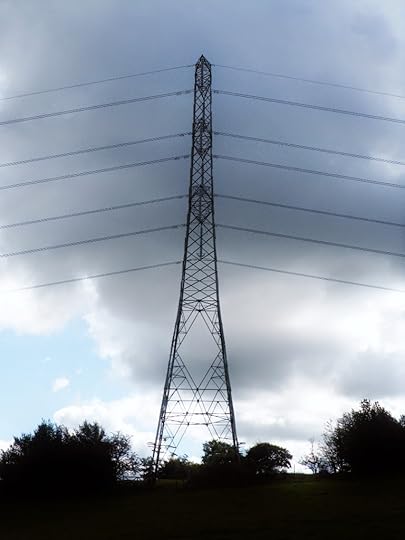 One of mine We sat on a bench at one end of a long street, and he took photos of some old houses at the street's distant other end. Then he sat and looked at the photos he'd just taken, cropped them, blew them up and, after some moments of silence, said, "That's me done with my old cameras." He has upgraded to better and better digitals, though, and almost always has one in his pocket.
One of mine We sat on a bench at one end of a long street, and he took photos of some old houses at the street's distant other end. Then he sat and looked at the photos he'd just taken, cropped them, blew them up and, after some moments of silence, said, "That's me done with my old cameras." He has upgraded to better and better digitals, though, and almost always has one in his pocket.
I also love digital cameras for giving a whole new lease of life to a friend of mine, who was becoming a bit detached from life, always looking back to the past - but to whom digital cameras have made an almost miraculous change. Now there are frequent outings to take photographs of birds and animals, photographs taken in the back yard, editing photographs on the computer, sharing them with fellow enthusiasts via Flickr and getting all kinds of compliments and tips in return... Submitting them to competitions, seeing them on the BBC website, turning them into cards and calendars... I feel I could almost kiss the digital cameras responsible for this change.
(5) The 'flashy-flicker' in my Tesco supermarket. I grew to hate the 'do-it-yourself' check-outs, because they kidded you they were going to be quicker, but were almost always slower and more frustrating than queuing at a check-out with an operator. There were always several things that the thing couldn't scan, and you had to wait for someone to come and check it. I gave up on them.
 The 'flashy-flicker' But now they have a hand-held gadget, which you take round the store with you. You scan everything you buy, and put it into your own shopping bags. And it works! I've used it several times now, and it actually is quicker and more convenient.
The 'flashy-flicker' But now they have a hand-held gadget, which you take round the store with you. You scan everything you buy, and put it into your own shopping bags. And it works! I've used it several times now, and it actually is quicker and more convenient.
When you've finished your shopping, you take it to a special check-out centre, and flash a bar-code stuck to one of the tills. This transfers your shopping to the till. If you haven't been chosen for a random check, you then pay. And get out of there.
Finally, my brother pleaded for the inclusion of the humble, overlooked USB. People use them all the time now, but hardly notice them. - The USB that allows you to carry photos and data about on a little memory-stick - that allows me to plug my sat-nav into the computer and update it, to plug my camera in and move photos to the computer.
It allows Davy to plug his camera or sim-card into his television and look at his photos on the bigger screen - and would allow me to connect my Fire to the TV and share 'Brave' with others, if I didn't prefer to selfishly watch all by myself. Ajay Bhatt
Ajay Bhatt
Ladies and gentleman, I give you Ajay V. Bhatt, the inventor of the USB, or Universal Serial Bus, without whom most of my favourite gadgets wouldn't be half so useful, or easy to operate.
So what are your favourite gadgets?
 Sat-Navschools in the back streets of towns I've never visited before, and libraries ditto.
Sat-Navschools in the back streets of towns I've never visited before, and libraries ditto.So I love my Sat-Nav. It saves me all that, 'Am I on the right road? Should I turn round? Should I stop and check the map?' It saves me squinting at tiny, tiny print in A-Zs (though they remain arguably the most useful books ever printed.)
The Institute of Advanced Driving frowns severely on anything that distracts from driving. So I've permanently silenced the CD player and radio in my car - and I would never dream of using a mobile phone, even a no-hands one, while I was driving anyway. But when it comes to my Sat-Nav, I don't care. I will not give up my Sat-Nav.
I argue that, by sparing me all the fret and worry about whether I'm on the right road, it enables me to concentrate more on driving, and makes me a better driver.
 Kindle Fire
Kindle Fire2) Kindle Fire or other tablet. From the moment I first used an e-reader, I was hooked. Yes, books are beautiful objects. I have been a fan of books all my life. I didn't expect to like e-readers - but now, I don't care, I hardly ever pick up a paper book.
Even though I live in the West Midlands, it's not an area rich in those cosy little bookshops we keep being told about, with a choice selection of books, and informed, helpful staff. In days past, I would have to travel to Birmingham, and when I got there, the book I wanted was - it was almost guaranteed - not in stock. I could order it, of course - and in 6-8 weeks they would notify me that it was going to take longer.
Whereas Amazon, for all its many sins, can be almost guaranteed to have any book I want in stock - and very likely as an ebook, which will be cheaper, and will zip to me through the ether in seconds. Remember a book while you're lying in bed at 12-30 at night, and about two minutes later, you're reading it.
But quite apart from that, I prefer reading an e-book. You don't have to grip a tightly bound, heavy book, and hold the pages open by main force. The number of times a paper book has sprung shut and lost my place! - An ebook always opens at the right place. You can mark places, and the bookmark never falls out.
And more - I can check emails on my Kindle Fire. I can play games and music on it. I can look at my photos. I can (using Docs to Go) write on it and then email my writing to myself. And, having read the Game of Thrones books on it, I then watched the series on my Kindle Fire.
When I had to stay away from home recently, I not only had reading material and documents on my Fire, but downloaded films and programmes. So I sat in my B&B, eating the biscuits, and watching 'Brave' (which I enjoyed no end, especially the prim queen transformed into a bear.)
As I write this, my Fire is within reach. It always is. I carry it about the house with me. I take it to bed with me. When I leave the house, it goes with me, in my bag. I love it.
(3) Yogurt Maker. This is certainly one of the most used
 gadgets in my house. I get through a lot of plain yoghurt, and buying it in the supermarket was expensive, and meant I was always running out unexpectedly.
gadgets in my house. I get through a lot of plain yoghurt, and buying it in the supermarket was expensive, and meant I was always running out unexpectedly. A friend, learning that I was thinking of buying a yoghurt maker, told me that I didn't need to buy a gadget. She explained how her mother made yoghurt, by wrapping a bowl of milk in blankets and putting it in the airing cupboard. But I don't have an airing cupboard. "Well, use a hot-water bottle and a duvet," my friend said.
It all seemed a lot of trouble if you haven't been raised to it. So I bought the famous Lakeland Yoghurt Maker for twenty quid. Two or three times a week, I put into it 2-3 spoonfuls of live yoghurt from my last batch, pour on a litre of full-fat long-life milk, switch it on - and leave it for 8 hours.
At the end of that time, I have a litre of plain yoghurt, with no added sugar and no preservatives.
Once it's made, you can, if you like, add any flavourings you want - fruit, ginger, cinnamon - marmite, if you want. But put aside the yoghurt to make the next batch first, because the flavouring might upset the bacteria that make the yoghurt.
Every two months or so, when my yoghurt is getting thin, I buy a small pot of live, plain yoghurt, and use that to make the next batch.
(4) Digital cameras. Need I say more? Easy to use, and no
 more buying film, and then having to pay for it to be developed. Whether you want to take arty, atmospheric shots of mountains and clouds, photos of a family birthday party, or close-ups of flowers or insects, you can take hundreds of snaps, edit them, turn them into t-shirts, mouse-mats, mugs...
more buying film, and then having to pay for it to be developed. Whether you want to take arty, atmospheric shots of mountains and clouds, photos of a family birthday party, or close-ups of flowers or insects, you can take hundreds of snaps, edit them, turn them into t-shirts, mouse-mats, mugs...My partner keeps hundreds, maybe thousands, of shots on camera sim-cards, plugs them into his tv, and uses them as references for painting.
He was always a keen photographer, and had weighty cameras with even weightier lenses which he didn't enjoy carrying on long walks. I introduced him to digital cameras, and was with him in Ludlow when he tried out his first. It was only about 6 megapixels.
 One of mine We sat on a bench at one end of a long street, and he took photos of some old houses at the street's distant other end. Then he sat and looked at the photos he'd just taken, cropped them, blew them up and, after some moments of silence, said, "That's me done with my old cameras." He has upgraded to better and better digitals, though, and almost always has one in his pocket.
One of mine We sat on a bench at one end of a long street, and he took photos of some old houses at the street's distant other end. Then he sat and looked at the photos he'd just taken, cropped them, blew them up and, after some moments of silence, said, "That's me done with my old cameras." He has upgraded to better and better digitals, though, and almost always has one in his pocket.I also love digital cameras for giving a whole new lease of life to a friend of mine, who was becoming a bit detached from life, always looking back to the past - but to whom digital cameras have made an almost miraculous change. Now there are frequent outings to take photographs of birds and animals, photographs taken in the back yard, editing photographs on the computer, sharing them with fellow enthusiasts via Flickr and getting all kinds of compliments and tips in return... Submitting them to competitions, seeing them on the BBC website, turning them into cards and calendars... I feel I could almost kiss the digital cameras responsible for this change.
(5) The 'flashy-flicker' in my Tesco supermarket. I grew to hate the 'do-it-yourself' check-outs, because they kidded you they were going to be quicker, but were almost always slower and more frustrating than queuing at a check-out with an operator. There were always several things that the thing couldn't scan, and you had to wait for someone to come and check it. I gave up on them.
 The 'flashy-flicker' But now they have a hand-held gadget, which you take round the store with you. You scan everything you buy, and put it into your own shopping bags. And it works! I've used it several times now, and it actually is quicker and more convenient.
The 'flashy-flicker' But now they have a hand-held gadget, which you take round the store with you. You scan everything you buy, and put it into your own shopping bags. And it works! I've used it several times now, and it actually is quicker and more convenient.When you've finished your shopping, you take it to a special check-out centre, and flash a bar-code stuck to one of the tills. This transfers your shopping to the till. If you haven't been chosen for a random check, you then pay. And get out of there.
Finally, my brother pleaded for the inclusion of the humble, overlooked USB. People use them all the time now, but hardly notice them. - The USB that allows you to carry photos and data about on a little memory-stick - that allows me to plug my sat-nav into the computer and update it, to plug my camera in and move photos to the computer.
It allows Davy to plug his camera or sim-card into his television and look at his photos on the bigger screen - and would allow me to connect my Fire to the TV and share 'Brave' with others, if I didn't prefer to selfishly watch all by myself.
 Ajay Bhatt
Ajay BhattLadies and gentleman, I give you Ajay V. Bhatt, the inventor of the USB, or Universal Serial Bus, without whom most of my favourite gadgets wouldn't be half so useful, or easy to operate.
So what are your favourite gadgets?
Published on October 10, 2014 16:00
October 3, 2014
That Robin Hood Vibe
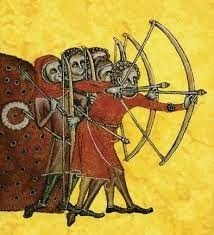 When I took up archery again, recently, I found I could barely draw my longbow half-way. It over-bowed me.
When I took up archery again, recently, I found I could barely draw my longbow half-way. It over-bowed me.So I started again with a recurve bow - which is fine, it's fun. But there just isn't the same Robin Hood vibe.
That was a couple of months ago.
I've joined The Stourbridge Company of Archers - I find something very appealing about the collective noun for archers being 'company.'
One of the coaches in the Company told me 'the easiest way to string a longbow.' Which was something I'd never been able to do, even when I could draw the thing. I always had to ask some passing bloke to do it for me, which vexed me no end.
So when I got home, I took my longbow out and tried stringing it. And I did it! Quite easily, too. I can't tell you the thrill of being able to string my own longbow at last.
(I'm sure Madwippit knows how to string a longbow very well, but for anyone who doesn't, and is interested, here's how. A longbow has the string permanently nocked at one end (unlike a recurve, where you take the string off completely.)
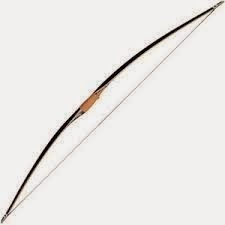 longbow
longbow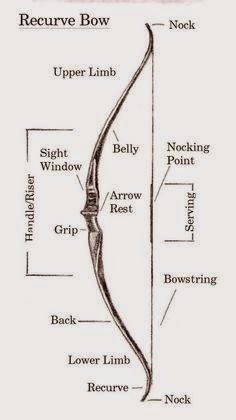 Recurve Bow
Recurve BowPut the strung end of the longbow in front of your left ankle, the tip touching the ground.
Step through the bow-string with your right foot. The bow-stave is now going behind your right leg, with its slightly curved tip lodged in front of your left ankle. The string is in front of your right leg.
Lift the bow so the bow-stave goes, as my archery friend put it, 'around the fat of your bum.'
Now pull the upper end of the bow forward, under your right arm. Clamp the bow-stave between your legs, press down with your right arm, and bend the bow-stave around 'the fat of your bum.'
With your right arm, squeeze the bow-stave in and down as, with your left hand, you slide the string up the stave and into its nock. Considering that I could barely draw the bow a few weeks ago, this isn't nearly as hard as I thought it would be. It's not effortless, but well within my capabilities.
My friend complained that this method bruised her left shin, so she didn't use it much. But I haven't found that it bruises.
Why did my previous club not tell me about this method? They
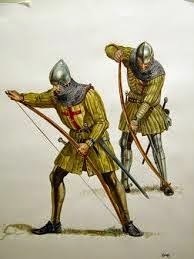 insisted that the only safe way to string a bow was to lodge the end in your instep, bend the bow with your left hand, and slide the string up to the nock with your right. I always found this beyond my strength.
insisted that the only safe way to string a bow was to lodge the end in your instep, bend the bow with your left hand, and slide the string up to the nock with your right. I always found this beyond my strength.Anyway, having triumphantly strung the bow, I tried drawing it - and found that I could almost - nearly - draw the string back to my chin. It was hard, but I could do it.
(I let the bow down without loosing the string, of course. I learned the lesson 'never loose an empty bow-string' the first time I ever picked up a bow, ten or more years ago. I drew back the string - and then loosed it before my instructor could tell me not to. It seemed the obvious thing to do. Big mistake! If you've ever wondered what it feels like to be a rat, shaken to death by a terrier, loose an empty bow-string. All the stored kinetic energy, instead of being released into the arrow, is released through you. It's a mistake you only make once, believe me - but one better not made at all.)
Even though the longbow still seemed a bit beyond me, I decided to take it along to archery that Sunday, and try it out. I took my recurve too, thinking that if I became incapable of drawing the longbow after a few arrows, I could swop to the recurve.
I arrived at the field to see the butts set out in a way new to me. Instead of being set out like this (with Os as butts and Is as archers):-
O O O O
I I I I
they were set out like this:-
O I O
O I O
O I O
So I left my bows in the car while I went to find out what was going on. It turned out they were holding a club tournament, longbow only - so it was handy that, by coincidence, I'd happened to bring my longbow.
I'd never shot in a tournament before, not even an informal club shoot like this. I thoroughly enjoyed it, even though my score was pathetic.
I shot at the second butt, along with a couple of juniors, a senior and a hardened longbowman, Bruce, who was, in fact, the holder of this tournament trophy which, he told me was 'a beautiful thing,' a bronze longbow standing upright in a longbow stand.
I told Bruce my fears of not being able to draw my bow more than two or three times. "It's always lighter with an arrow on the string," he said - and this proved to be true. With an arrow on the string, the bow seemed to draw far more easily. I was able to come up to full draw and hold it while I aimed.
I shot for the whole tournament: 96 arrows - far more than I thought I'd be able to manage. The bow never felt too hard to draw. "It's psychological," Bruce said. "You're thinking about your stance and aim, and not about the weight."
That's probably true, but I couldn't help feeling that the bow was glad to be shooting again, and went easy on me. And, maybe, even, it had put into my head the idea of taking it along that day. Ridiculous, I know, but there's just something about a longbow... They seem more alive, somehow, than a recurve.
I found I was really glad to be shooting the longbow again. I felt something like relief, even though I wasn't good. The longbow just feels better than the recurve, even though it's a lot harder to use. There's less faff - you don't have to put it together and use a stringer to string it. You just string a longbow (once you know how), and there you are, set to go. And there's that Robin Hood vibe. You can't beat it.
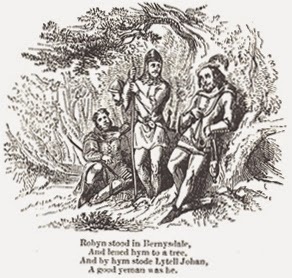
The shoot worked like this - The adults lined up between the rows of butts, on the fifty yard line, and shot six arrows each at their appointed target.
Then the Juniors went to their line, ten yards closer, and took their turn, while the older and more experienced archers stood behind them, giving advice and cheering them on.
We all walked up together, to check our scores and collect our arrows. One person from every butt collected the scores.
Then we turned round and shot at the other row of butts. At half time we took a break, and then the adults shot from the Junior's line, and the Juniors moved ten yards forward to a position marked by a red flag.
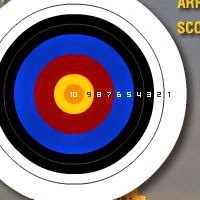
I'm still so out of practice that I feel happy if I hit the butt, let alone score anything. I managed to put at least two arrows on the butt about half of the time. The rest either fell short or went over the top - but a lot of arrows were doing the same, so I didn't feel too much of a doughnut. I was getting the line, but not quite judging the distance.
If the arrow hits the 'petticoat' - that is, the area of the face outside the outer ring, it scores nothing, so sometimes, even when I hit the butt, I didn't score. But I managed a few ones, a five and a three - and my best score was nine and seven. "Somebody's getting their distance," said Bruce. But, sadly, it didn't last. It was back to misses and ones after that.
(We were using a different scoring system to one shown in the picture. The inner and outer rings for each colour were ignored. So landing in the white, scored one. Black=3. Blue=5. Red=7 and Gold=9)
I'm already looking forward to next Sunday. The Stourbridge Company (club colours: white, black, blue, red and yellow, like the face,) have a beautiful shooting ground, surrounded by tall trees, with buzzards gliding overhead. As you walk back from the butts with your arrows, you look up at the sky, clouds and tree-tops, and breathe deep. It's grand. Thank you, Mr. Somers, industrialist, who left the big house and grounds to the local people, 'for their recreation,' after WW2. I can only suppose he didn't want the house back after troops had been housed in it - still, it was generous of him.
It'll be me and the longbow, again, recreating next week. I must look into getting some wooden arrows for it... must keep it happy.
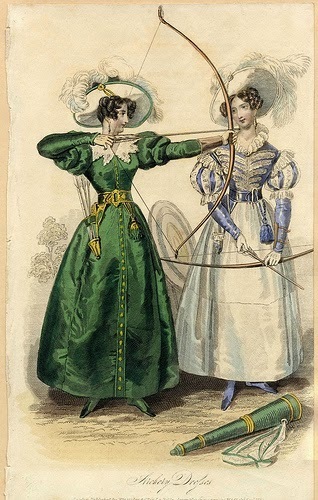 The Fair Toxopholists - not quite the Robin Hood Vibe
The Fair Toxopholists - not quite the Robin Hood Vibe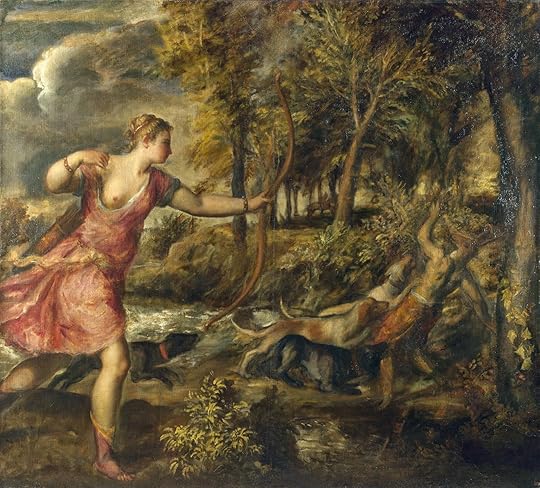 Actaen getting his - by Titian. Now that's a Diana who looks like she means business.
Actaen getting his - by Titian. Now that's a Diana who looks like she means business.
Published on October 03, 2014 16:00
September 19, 2014
Character
Saw this quote in the Big Issue, from actor Eddie Marsan:
 Eddie Marsan: Wiki Commons
Eddie Marsan: Wiki Commons
I turned it over in my mind, as you do, trying to find fault with it - and I couldn't.
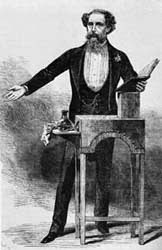 A writer acting while crowds faint I've often thought writing was akin to acting - without the performance part most of the time, obviously. But, as a writer, you think about what your character looks like, and what they would choose to wear (supposing their situation allows them to have a choice. But even then, what they would prefer to wear, if they had a choice, says something about them.)
A writer acting while crowds faint I've often thought writing was akin to acting - without the performance part most of the time, obviously. But, as a writer, you think about what your character looks like, and what they would choose to wear (supposing their situation allows them to have a choice. But even then, what they would prefer to wear, if they had a choice, says something about them.)
You think about what they sound like. Do they chatter, or hardly speak at all? Do they speak in a low, level tone, or quickly - or nervously?
Do they listen to others, or try to drown out anything anyone else has to say?
What kind of words do they choose to use? Do they avoid slang because they think it's common - or make a point of using it, to claim identification with a certain group. Or they may simply use the language of their time and place because they don't know any other.
What's their predominating trait? - Suspicion? Anger? Fear? Because that trait is going to govern the way they respond to situations, even if they have it well under control. - Though not necessarily in a straight-forward way. Someone who is grounded in Fear, for instance, is not necessarily going to behave timidly. They might, like an agitated, snarling dog, respond with aggression.
Do they think things through carefully or act impulsively? Do they tend towards dithering or decisiveness?
Above all, perhaps: What do they want? What is it they are always striving towards? - Victory? Security? Status? Love? Power?
How is all this affected by their physicality? - I mean, can they rely on their good looks for charm, or have they had to work on their charm of manner?
Or are they charmless, and try to intimidate, one way or another?
Are they confident of being able to move, run, jump - or do they have to factor in that their body is not agile or reliable?
But once you've worked all this out, you try to bring it all together, and then step behind it and inhabit it. You try, as Marsan says, to 'think the thoughts of your character.'
This, I think, is why I often find it helpful to have 'a model' for a character: a very clear visual image of what they look like, how they move, how they dress. Once I've worked out a character, I find I can throw this image over all the 'characteristics', and the visual image helps to pull them all together. I can then think of the image, step inside it, so to speak, and look out through its eyes.
I don't know how much time actors spend thinking about the other characters in a play but, as a writer, once you've 'played the part' of one character, you step over into another character and do the same again.
And, while inhabiting one character you listen to the others - as Marsan brilliantly says - 'with the same set of prejudices your character has.' - Because those prejudices will colour the understanding - or misunderstanding - of what is said by the other characters and will dictate the listening character's reaction to them.
So then you can work out what the listening character will say or do - before you move into another character and assume their thoughts and prejudices.
This is why, having written a scene from one point of view, I often have to take a break and go for a walk or do the washing-up before writing another. I need time to struggle out of one set of thoughts and prejudices, and struggle into another. - Costume change!
I'm doing this quite often as I write my present WIP. It started with three points of view - one a teenage girl, the second her father, and the third his new girl-friend. Then the ex-wife suddenly spoke up and pushed her way into things.
Before taking up each character, I have to stop and think: what does this one want? What's their attitude to life? And then I have to try and understand, see, and hear whatever's going on in the story with their mind, filtered through their prejudices.
I'd be really interested to hear the thoughts of other writers and actors on this - and don't hang back if you've never appeared 'on the professional stage' of either profession. It's insight into the craft I'm interested in, not whether you've been paid!
Photo of Eddie Marsan File:EddieMarsan09TIFF.jpg licensed with Cc-by-sa-2.0
 Eddie Marsan: Wiki Commons
Eddie Marsan: Wiki Commons"I learned that acting's not about doing anything - it's about thinking the thoughts of the character. And listening with the same set of prejudices your character has."I thought that was brilliant.
I turned it over in my mind, as you do, trying to find fault with it - and I couldn't.
 A writer acting while crowds faint I've often thought writing was akin to acting - without the performance part most of the time, obviously. But, as a writer, you think about what your character looks like, and what they would choose to wear (supposing their situation allows them to have a choice. But even then, what they would prefer to wear, if they had a choice, says something about them.)
A writer acting while crowds faint I've often thought writing was akin to acting - without the performance part most of the time, obviously. But, as a writer, you think about what your character looks like, and what they would choose to wear (supposing their situation allows them to have a choice. But even then, what they would prefer to wear, if they had a choice, says something about them.)You think about what they sound like. Do they chatter, or hardly speak at all? Do they speak in a low, level tone, or quickly - or nervously?
Do they listen to others, or try to drown out anything anyone else has to say?
What kind of words do they choose to use? Do they avoid slang because they think it's common - or make a point of using it, to claim identification with a certain group. Or they may simply use the language of their time and place because they don't know any other.
What's their predominating trait? - Suspicion? Anger? Fear? Because that trait is going to govern the way they respond to situations, even if they have it well under control. - Though not necessarily in a straight-forward way. Someone who is grounded in Fear, for instance, is not necessarily going to behave timidly. They might, like an agitated, snarling dog, respond with aggression.
Do they think things through carefully or act impulsively? Do they tend towards dithering or decisiveness?
Above all, perhaps: What do they want? What is it they are always striving towards? - Victory? Security? Status? Love? Power?
How is all this affected by their physicality? - I mean, can they rely on their good looks for charm, or have they had to work on their charm of manner?
Or are they charmless, and try to intimidate, one way or another?
Are they confident of being able to move, run, jump - or do they have to factor in that their body is not agile or reliable?
But once you've worked all this out, you try to bring it all together, and then step behind it and inhabit it. You try, as Marsan says, to 'think the thoughts of your character.'
This, I think, is why I often find it helpful to have 'a model' for a character: a very clear visual image of what they look like, how they move, how they dress. Once I've worked out a character, I find I can throw this image over all the 'characteristics', and the visual image helps to pull them all together. I can then think of the image, step inside it, so to speak, and look out through its eyes.
I don't know how much time actors spend thinking about the other characters in a play but, as a writer, once you've 'played the part' of one character, you step over into another character and do the same again.
And, while inhabiting one character you listen to the others - as Marsan brilliantly says - 'with the same set of prejudices your character has.' - Because those prejudices will colour the understanding - or misunderstanding - of what is said by the other characters and will dictate the listening character's reaction to them.
So then you can work out what the listening character will say or do - before you move into another character and assume their thoughts and prejudices.
This is why, having written a scene from one point of view, I often have to take a break and go for a walk or do the washing-up before writing another. I need time to struggle out of one set of thoughts and prejudices, and struggle into another. - Costume change!
I'm doing this quite often as I write my present WIP. It started with three points of view - one a teenage girl, the second her father, and the third his new girl-friend. Then the ex-wife suddenly spoke up and pushed her way into things.
Before taking up each character, I have to stop and think: what does this one want? What's their attitude to life? And then I have to try and understand, see, and hear whatever's going on in the story with their mind, filtered through their prejudices.
I'd be really interested to hear the thoughts of other writers and actors on this - and don't hang back if you've never appeared 'on the professional stage' of either profession. It's insight into the craft I'm interested in, not whether you've been paid!
Photo of Eddie Marsan File:EddieMarsan09TIFF.jpg licensed with Cc-by-sa-2.0
Published on September 19, 2014 16:00
September 12, 2014
The Lion and the Unicorn: Scotland and England Tussle
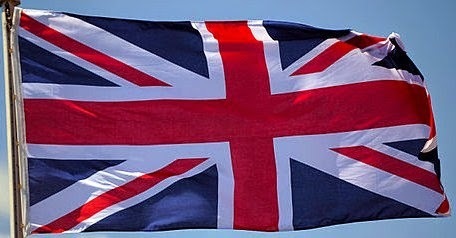 The Union Jack
The Union Jack Scotland votes on the 18th.
By next Saturday we shall know whether our flag is the Union or Disunion Jack.
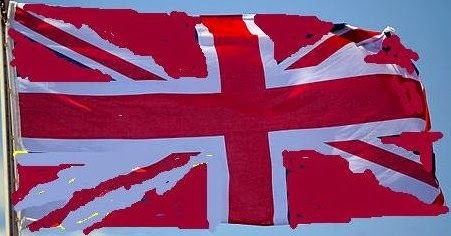 The Disunion Jack
The Disunion JackIt 's one of the most exciting political stooshies for many a long year. If I had a vote, I'm still not sure how I'd use it.
Of the people I know, the one most vehemently opposed to Scottish Independence is a Scot, my partner. He doesn't have a vote either, because he's lived in England - and other parts of the world - for at least half his life. In his opinion, voting 'yes' is the worst, most stupid thing Scotland could do. It will be a disaster. Business will leave, money will leave, talent will leave. The economy will crash. Instead of being proudly independent, the Scots will be begging England to save them. Again.
He's as proud as the next Scot of Scotland's many achievements but, he says, there has to be some realism - 'they should stop dreaming of Bonnie Prince bloody Charlie.' The union only came about in the first place, he says, because of the Darien Scheme, a hare-brained venture which almost wrecked Scotland's economy. England saved Scotland's bacon then, and has done so since (though hardly from simple kindness, it has to be said.) England built Scotland's modern road system, invested in Scotland's economy, is paying for their free universities and prescriptions.
'England has been amazingly patient,' says Davy. If the Scots flounce off, maybe England won't be so patient when - at some time in the future - they want to creep back again. Presumably the English will then get a vote on whether or not to rejoin with the Jocks (though, personally, I wouldn't bet on our leaders allowing us a say) - and the English will blow a long, loud raspberry.
So says Davy.
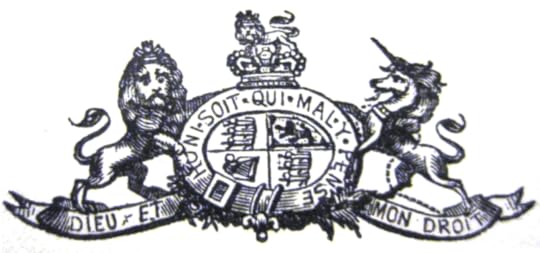 They're fighting for that crown again...
They're fighting for that crown again...Davy's brother Jim, when I was talking with him on Barra earlier this year, had quite a different take. 'We are not fools or children,' Jim said. 'We have oil, and gas, we have IT industries and a thriving export trade in whisky, and we can manage our economy perfectly well, thank you very much! - And we're sick and tired of being governed by public-school educated Tory Little-Englanders we never voted for. At every election for the past 30 years, Scotland has voted solidly to the left, and ended up with Tories or Tories-Lite in government. Do you call that representation? Do you call that a democracy?'
And, oh lord, I can identify with that!
Furthermore, Jim said, politics in the UK have become stale, moribund. Election turnouts are low, and results massively unrepresentative, because most people know their votes won't make any difference. So they've stopped caring.
This is very true. I can no longer bring myself to vote for Labour, and would have to have a gun to my head before I would vote Lib-Dem (Tories in sheep's clothing) or (spit) Tory.
I would vote Green, since their manifesto is broadly what I want - but in my consitituency, if I vote Green, I'm simply wasting my vote. So I've been effectively disenfranchised. But is there any likelihood of proportional representation being introduced any time soon? - No, because it doesn't suit either Labour or Tories, and never mind what the voters want.
According to Jim, this disenfranchisement is what Scottish Independence is about. By leaving England, they would be doing England a huge favour - by delivering to Westminster's arse the biggest boot it's felt in many long, self-satisfied, cosy, careerist years spent cuddled up to Big Business.
Scottish Independence, says Jim, would force a big shake-up in British politics.
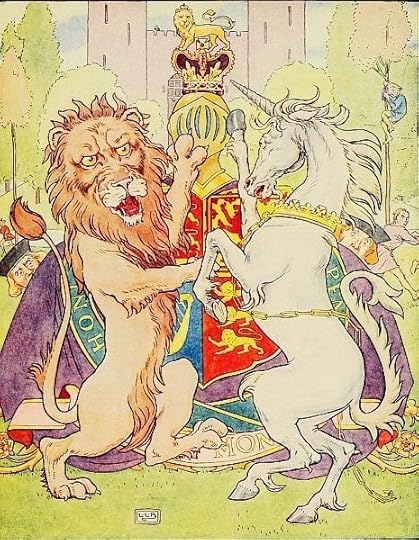
I can see it. Wales would want independence. Cornwall, Yorkshire, Northumbria - if Scotland can manage its own affairs, why would the rest of Britain continue to suffer being ruled by Tories they never voted for?
Britain might become a federation of small states, each governing itself, but sending representatives to a larger, federal council. My cousin, living in Switzerland, admires the system, and says it works very well, with fewer extremes than in Britain, and far more checks and balances.
I like the sound of all this - but have to admit that there is a part of me that always wants to see the apple-cart kicked over and the apples rolling about everywhere
Davy hoots in derision at all Jim's arguments. The vote will be, 'No,' he insists. The Scots have too much good sense to be carried away by all that skirling in the heather stuff - and they have too much to lose.
Jim says Independence for Scotland is the best thing that could happen for our future.
Davy says it will bring sorrow to generations yet unborn.
It all makes me think of the words of Dorothy Rowe, the psychologist. (I paraphrase):
'Every action has consequences. Some of the consequences are foreseen and some are unforeseen.
'Of the foreseen consequences, some will be predicted to be good, and some will be predicted to be bad.
'Some of the predicted good consequences will, in the event, turn out to be bad.
'Some of the predicted bad consequences will, in the event, turn out to be good.
'Of the unforeseen consequences, some will be immediately experienced as good, and some as bad
'Some of those immediately experienced as bad will turn out to be good in the end.'Some immediately experienced as good will, in time, turn out to be bad.'
So it goes.
This time next week, we'll know whether the lion has had its bum kicked, or the unicorn has had its horn bent.
Either way, I don't think anyone will be handing round brown bread or plum cake.
The Union Jack Photo: LA(Phot) Simmo Simpson/MOD [see page for license], via Wikimedia Commons
The lion and unicorn from the James' Bible, and the nursery rhyme illustration, are public domain, from Project Gutenburg, through wiki commons.
Published on September 12, 2014 16:00
September 5, 2014
Sticking to Knitting - Some Thoughts on Brooks Newland
Last week, I opened my newspaper and read
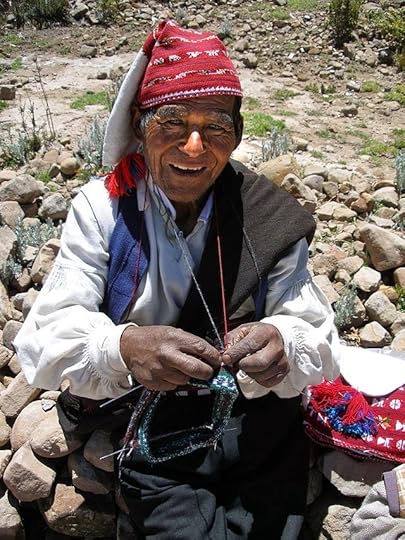 A knitter, not a sneering Torythat the Tory 'Minister for Civil Society' (whatever the hell that means), a person by the name of Brooks Newmark, has had the bald audacity to tell British charities to 'stick to their knitting' and 'keep out of politics.'
A knitter, not a sneering Torythat the Tory 'Minister for Civil Society' (whatever the hell that means), a person by the name of Brooks Newmark, has had the bald audacity to tell British charities to 'stick to their knitting' and 'keep out of politics.'
Obviously, he's never heard that 'everything is political.' A strange omission for one in his line of taking money from the public purse.
It's an interesting phrase, that - 'stick to your knitting.' Shall we unpack it? Who does he think knits? Who can he mean?
I doubt that he's thinking of the fishermen and whalers of the Orkneys and Shetlands, who spent such spare time as they had on board knitting and embroidering, to produce warm clothing for themselves and for sale. Which makes knitting and embroidery the pastime of tough, independent, self-reliant men who would have little time or sympathy for a soft, southern,Tory minister.
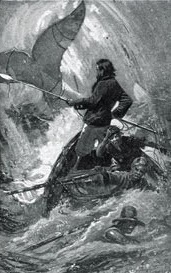 Taking a break from knitting No, I don't imagine he's thinking of those crofters. Do you suppose that, when he says, 'stick to your knitting' he's thinking of women? Perhaps the kind of women whom he imagines, with his limited, dated Tory imagination, staffing charities. In Newmark's tiny, rigid mind, Oxfam and Shelter, among others, are staffed entirely by dear little old ladies with too much time on their hands, who while it away by knitting, and who, in the minister's words, should concentrate on that and on 'helping others,' and not worry their dear little blue-rinsed heads with politics. Aah, bless.
Taking a break from knitting No, I don't imagine he's thinking of those crofters. Do you suppose that, when he says, 'stick to your knitting' he's thinking of women? Perhaps the kind of women whom he imagines, with his limited, dated Tory imagination, staffing charities. In Newmark's tiny, rigid mind, Oxfam and Shelter, among others, are staffed entirely by dear little old ladies with too much time on their hands, who while it away by knitting, and who, in the minister's words, should concentrate on that and on 'helping others,' and not worry their dear little blue-rinsed heads with politics. Aah, bless.
Newmark, dear readers, is an example of the people the Tories rule us with. Is it any wonder the Scots want to leave?
Lisa Nandy, shadow minister for that thing, 'civil society,' said, Newmark's remarks are '...patronising and...deeply offensive at a time when charities are picking up the pieces from this government's awful, unfair policies...'
Newmark, we can only suppose, is also deeply ignorant of the role charities have always played, both in politics and 'civil society.'
There was a time when we had no other government except that by the rich, land-owning, factory-owning, selfish elite, who governed entirely in their own interest. (Some might argue - none me, good lord, but some - that Newmark and his party continue to represent these people, and to manage affairs for their benefit.)
In the past, the Tory Party, most of them, couldn't see any problem with children crawling under dangerous, working machinery to clean it, or spending all their daylight hours three miles underground in pits. They sentimentalised childhood while the children of the poor were prostituted and worked to death.
The Tory Party, most of them, couldn't see anything wrong with slavery - well, it made them rich, didn't it? Built them beautiful home. It was good for trade.
Most of the Tory Party saw nothing wrong (and they were looking in the other direction anyway) with burning Scottish crofters out of their homes and sending them off to starve by the seashore, while the landlords replaced them with sheep. After all, these inland crofters could easily learn to fish, couldn't they? Nothing to it - they only had to buy a boat. Idleness, that was their problem.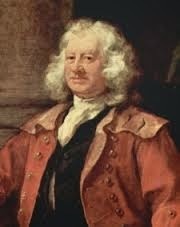 Should have stuck to his knitting...
Should have stuck to his knitting...
Captain Coram had to beg his friends for money, and set up a charity to prevent abandoned babies being left to starve in gutters. Government had been leaving them to die for years - and would have gone on letting them die if it hadn't been for Captain Coram.
It goes on and on - shocking prison conditions, appalling working and housing conditions for the poor, starvation wages, under-age prostitution, lack of education, homelessness... All things which the comfortable, complacent, selfish political elite did nothing to alter until they were goaded and prodded into action by charities. Which is another name for a minority of determined, incensed people getting on doing themselves what government refuses to acknowledge as a problem or do anything about.
Some of those determined, honourable people have always been women. Some of them may even have knitted. I'm not sure that Coram, or Shaftesbury, or Barnardo was either female or a knitter.
Oxfam, Shelter and all those other 'political' charities are continuing a proud and honourable tradition by opposing, among other things, zero-hours contracts and benefit cuts.
(These cuts having been imposed with ever greater severity because of a banking crisis brought about by greedy bankers who exploited the freedom from pesky regulations given to them, originally, by the Tory Party. Rather in the manner of giving a fox freedom in a chicken house.
(After the crash, the bankers are rewarded with rescue and bonuses, while the poor are penalised for doing the work which supports the rich, greedy bankers.)
The ghastly Newmark later back-pedalled hard, saying that he'd 'only' meant that charities should keep out of 'party politics.' A phrase without meaning except for weasels. Where does 'party politics' end and 'everything is political' begin?
"They [charities] have an important role to play in helping to shape government policy," said the ghastly homonculus, continuing his vein of pompous condescension. "...they have a right to campaign (why, thank you!) but should stay out of... party politics."
I would like Newmark to answer this question: Why should they stay out of party politics? Or any other kind of politics?
Since everything is political, and politics is the way we order our communities, and decide the laws we live our everyday lives by, then the people who make up charities have as much right to take part in politics, even party politics, as the very wealthy American Newmark does. Indeed, they have a duty to take part in 'party politics.'
Another question for him: What, exactly, does he think 'free speech' means?
Think of those charity workers - knitting needles flashing away as they work on the front-line of civil society, where things are a little less civil than in Westminster. Now and again, I think it's fair to say, they witness, up close, the cruel and unfair effects of the policies concocted by such as Newmark.
When that happens, it might be argued that those knitting charity workers - pinnies, blue-rinses and all - have a duty to lay their knitting and tea-pots aside and report what they see to the rest of our civil society - to speak up and make people aware of what is going on.
Just as, in the past, people spoke up about the injustice of slavery, and workhouses, and the Clearances.
As a party politician and a servant of civil society, it might be thought that Newmark should humbly thank the charities for doing work that his government should be doing, and for calling attention to his government's - well, shall we be polite and say, his government's 'mistakes'? Because it's not possible, is it, that, for instance, something as unfair as zero-hours contracts would have been allowed, except by mistake?
It couldn't be that the Tory Party represents people who benefit from zero-hours contracts, and therefore resent charities objecting to them? - What? I won't believe it of them. It's not as if the Tory Party, which Newmark works for of his own free will, was ever involved in anything, er, less than fair and just and of benefit to all, is it? (Opposition to the founding of the NHS, dismantling of the NHS, Poll Tax, Bedroom Tax, destruction of unions, selling off and destruction of state-owned assets, opposition to working conditions reform, Tolpuddle Martyrs, heavier taxation for the poor...)
So far, Newmark has not humbly apologised to charities, or thanked them for their honesty - or for doing more to protect members of our 'civil society' than the Tories have done.
But then, he's a Tory.
Expect nothing from a pig but a grunt.
Pigs, though, are nice.
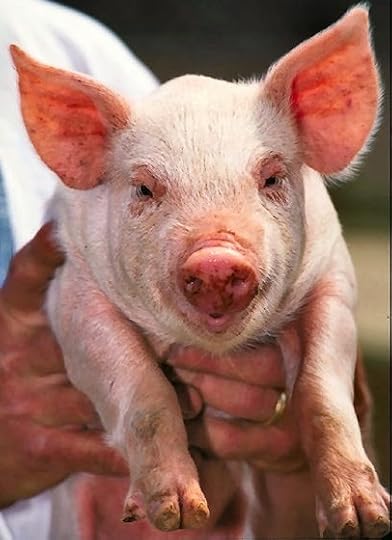
Photograph of knitter: Thomas Quine, Wikimedia Commons.
 A knitter, not a sneering Torythat the Tory 'Minister for Civil Society' (whatever the hell that means), a person by the name of Brooks Newmark, has had the bald audacity to tell British charities to 'stick to their knitting' and 'keep out of politics.'
A knitter, not a sneering Torythat the Tory 'Minister for Civil Society' (whatever the hell that means), a person by the name of Brooks Newmark, has had the bald audacity to tell British charities to 'stick to their knitting' and 'keep out of politics.'Obviously, he's never heard that 'everything is political.' A strange omission for one in his line of taking money from the public purse.
It's an interesting phrase, that - 'stick to your knitting.' Shall we unpack it? Who does he think knits? Who can he mean?
I doubt that he's thinking of the fishermen and whalers of the Orkneys and Shetlands, who spent such spare time as they had on board knitting and embroidering, to produce warm clothing for themselves and for sale. Which makes knitting and embroidery the pastime of tough, independent, self-reliant men who would have little time or sympathy for a soft, southern,Tory minister.
 Taking a break from knitting No, I don't imagine he's thinking of those crofters. Do you suppose that, when he says, 'stick to your knitting' he's thinking of women? Perhaps the kind of women whom he imagines, with his limited, dated Tory imagination, staffing charities. In Newmark's tiny, rigid mind, Oxfam and Shelter, among others, are staffed entirely by dear little old ladies with too much time on their hands, who while it away by knitting, and who, in the minister's words, should concentrate on that and on 'helping others,' and not worry their dear little blue-rinsed heads with politics. Aah, bless.
Taking a break from knitting No, I don't imagine he's thinking of those crofters. Do you suppose that, when he says, 'stick to your knitting' he's thinking of women? Perhaps the kind of women whom he imagines, with his limited, dated Tory imagination, staffing charities. In Newmark's tiny, rigid mind, Oxfam and Shelter, among others, are staffed entirely by dear little old ladies with too much time on their hands, who while it away by knitting, and who, in the minister's words, should concentrate on that and on 'helping others,' and not worry their dear little blue-rinsed heads with politics. Aah, bless.Newmark, dear readers, is an example of the people the Tories rule us with. Is it any wonder the Scots want to leave?
Lisa Nandy, shadow minister for that thing, 'civil society,' said, Newmark's remarks are '...patronising and...deeply offensive at a time when charities are picking up the pieces from this government's awful, unfair policies...'
Newmark, we can only suppose, is also deeply ignorant of the role charities have always played, both in politics and 'civil society.'
There was a time when we had no other government except that by the rich, land-owning, factory-owning, selfish elite, who governed entirely in their own interest. (Some might argue - none me, good lord, but some - that Newmark and his party continue to represent these people, and to manage affairs for their benefit.)
In the past, the Tory Party, most of them, couldn't see any problem with children crawling under dangerous, working machinery to clean it, or spending all their daylight hours three miles underground in pits. They sentimentalised childhood while the children of the poor were prostituted and worked to death.
The Tory Party, most of them, couldn't see anything wrong with slavery - well, it made them rich, didn't it? Built them beautiful home. It was good for trade.
Most of the Tory Party saw nothing wrong (and they were looking in the other direction anyway) with burning Scottish crofters out of their homes and sending them off to starve by the seashore, while the landlords replaced them with sheep. After all, these inland crofters could easily learn to fish, couldn't they? Nothing to it - they only had to buy a boat. Idleness, that was their problem.
 Should have stuck to his knitting...
Should have stuck to his knitting...Captain Coram had to beg his friends for money, and set up a charity to prevent abandoned babies being left to starve in gutters. Government had been leaving them to die for years - and would have gone on letting them die if it hadn't been for Captain Coram.
It goes on and on - shocking prison conditions, appalling working and housing conditions for the poor, starvation wages, under-age prostitution, lack of education, homelessness... All things which the comfortable, complacent, selfish political elite did nothing to alter until they were goaded and prodded into action by charities. Which is another name for a minority of determined, incensed people getting on doing themselves what government refuses to acknowledge as a problem or do anything about.
Some of those determined, honourable people have always been women. Some of them may even have knitted. I'm not sure that Coram, or Shaftesbury, or Barnardo was either female or a knitter.
Oxfam, Shelter and all those other 'political' charities are continuing a proud and honourable tradition by opposing, among other things, zero-hours contracts and benefit cuts.
(These cuts having been imposed with ever greater severity because of a banking crisis brought about by greedy bankers who exploited the freedom from pesky regulations given to them, originally, by the Tory Party. Rather in the manner of giving a fox freedom in a chicken house.
(After the crash, the bankers are rewarded with rescue and bonuses, while the poor are penalised for doing the work which supports the rich, greedy bankers.)
The ghastly Newmark later back-pedalled hard, saying that he'd 'only' meant that charities should keep out of 'party politics.' A phrase without meaning except for weasels. Where does 'party politics' end and 'everything is political' begin?
"They [charities] have an important role to play in helping to shape government policy," said the ghastly homonculus, continuing his vein of pompous condescension. "...they have a right to campaign (why, thank you!) but should stay out of... party politics."
I would like Newmark to answer this question: Why should they stay out of party politics? Or any other kind of politics?
Since everything is political, and politics is the way we order our communities, and decide the laws we live our everyday lives by, then the people who make up charities have as much right to take part in politics, even party politics, as the very wealthy American Newmark does. Indeed, they have a duty to take part in 'party politics.'
Another question for him: What, exactly, does he think 'free speech' means?
Think of those charity workers - knitting needles flashing away as they work on the front-line of civil society, where things are a little less civil than in Westminster. Now and again, I think it's fair to say, they witness, up close, the cruel and unfair effects of the policies concocted by such as Newmark.
When that happens, it might be argued that those knitting charity workers - pinnies, blue-rinses and all - have a duty to lay their knitting and tea-pots aside and report what they see to the rest of our civil society - to speak up and make people aware of what is going on.
Just as, in the past, people spoke up about the injustice of slavery, and workhouses, and the Clearances.
As a party politician and a servant of civil society, it might be thought that Newmark should humbly thank the charities for doing work that his government should be doing, and for calling attention to his government's - well, shall we be polite and say, his government's 'mistakes'? Because it's not possible, is it, that, for instance, something as unfair as zero-hours contracts would have been allowed, except by mistake?
It couldn't be that the Tory Party represents people who benefit from zero-hours contracts, and therefore resent charities objecting to them? - What? I won't believe it of them. It's not as if the Tory Party, which Newmark works for of his own free will, was ever involved in anything, er, less than fair and just and of benefit to all, is it? (Opposition to the founding of the NHS, dismantling of the NHS, Poll Tax, Bedroom Tax, destruction of unions, selling off and destruction of state-owned assets, opposition to working conditions reform, Tolpuddle Martyrs, heavier taxation for the poor...)
So far, Newmark has not humbly apologised to charities, or thanked them for their honesty - or for doing more to protect members of our 'civil society' than the Tories have done.
But then, he's a Tory.
Expect nothing from a pig but a grunt.
Pigs, though, are nice.

Photograph of knitter: Thomas Quine, Wikimedia Commons.
Published on September 05, 2014 16:00
August 29, 2014
Flatcap Day out in Edinburgh
 Edinburgh Castle - Wikimedia Creative Commons
Edinburgh Castle - Wikimedia Creative CommonsA couple of weeks ago, I enjoyed a Flatcap day out in
Edinburgh.
I should explain - I'm a member of the other SAS, the Scattered Authors Society, which has a chat-board called 'Balaclava.'
The lovely Penny Dolan (who wrote 'A Boy Named
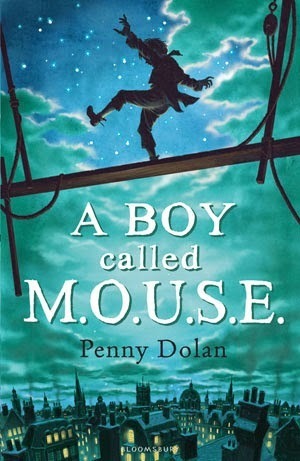 M.O.U.S.E' which I recommend highly) started an off-shoot group, called 'Flatcap' - partly because it keeps up the head-gear theme and partly, I suppose, because Flatcap is about work.
M.O.U.S.E' which I recommend highly) started an off-shoot group, called 'Flatcap' - partly because it keeps up the head-gear theme and partly, I suppose, because Flatcap is about work.Its purpose is to spur on the writers who form its small membership. They have to say what it is they intend to work on, and then report on progress. It's highly effective for most of its members, though for me, not so much. (My fault entirely, not the group's.)
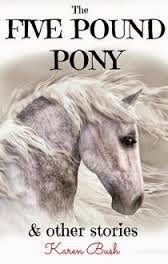 It concentrates a writer's mind wonderfully when they know they will have to report to a group of other writers, who might have written many more thousands of words than they have. Karen Bush, especially, has been powering through the pages.
It concentrates a writer's mind wonderfully when they know they will have to report to a group of other writers, who might have written many more thousands of words than they have. Karen Bush, especially, has been powering through the pages.Anyway, a couple of weeks ago, I was in Edinburgh - arguably the best capital city in the UK, though it may soon be leaving us - and I was at a loose end. So I emailed a couple of Flatcappers, who I knew lived near (or near-ish) Old Reekie - Linda Strachan and Joan Lennon.
 Joan
JoanThey both put aside their own work to travel into Edinburgh and meet up with me.
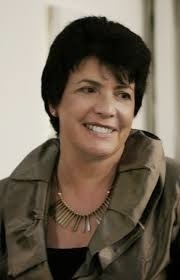 Linda First I met Linda at Waverley Station, and we walked to the Dovecot Cafe, where Joan was already waiting. We ordered coffee and we talked, for about two hours non-stop - oh, about the fantasy Linda is working on, and the prospects for Joan's novel of the Stone-Age, Silver Skin (which I am looking forward to), and my consultancy training with the Royal Literary Fund, and Joan's poetry (which is great and we keep urging her to produce an ebook) - and agents and publishers and blogging and -
Linda First I met Linda at Waverley Station, and we walked to the Dovecot Cafe, where Joan was already waiting. We ordered coffee and we talked, for about two hours non-stop - oh, about the fantasy Linda is working on, and the prospects for Joan's novel of the Stone-Age, Silver Skin (which I am looking forward to), and my consultancy training with the Royal Literary Fund, and Joan's poetry (which is great and we keep urging her to produce an ebook) - and agents and publishers and blogging and - 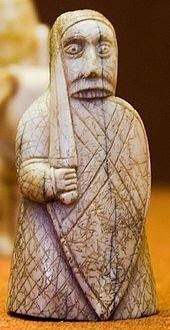 Berserker
BerserkerNobody could wish for better, wittier, livelier companions than Joan and Linda.
Then we went to the National Museum of Scotland because Joan wanted to show me their stone-age exhibits (we are both keen on the Stone Age) and also those of Lewis chessmen who live there. Which included a berserker! - I bought myself a couple of replicas: one of those berserkers, and a King. I was torn between the King and Queen, but eventually settled on the King because of his beautifully combed tresses.
And all the time we were talking...
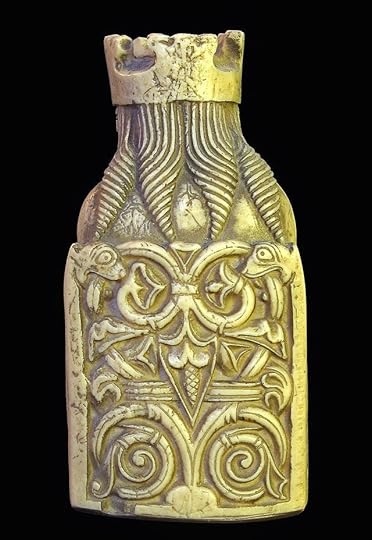 King, King, let down your hair Linda showed us some display cases designed by an artist. I'm ashamed not to remember more, but the cases were works of art in themselves - like strange robots, with pieces displayed in boxes in their chests or arms.
King, King, let down your hair Linda showed us some display cases designed by an artist. I'm ashamed not to remember more, but the cases were works of art in themselves - like strange robots, with pieces displayed in boxes in their chests or arms.Then it was lunch-time, and Linda guided us to the library cafe - because, it being the middle of the Festival, we were unlikely to get a seat anywhere else. (We passed cafe after cafe, packed to the doors.) Once in the library, we talked and talked.
The party broke up at about four. We all had to catch trains from Waverley - and as we rose to go, there was a flash of lightening, a clap of thunder worthy of 'Macbeth', and storm-clouds burst over the city.
Linda and Joan had been wise enough to bring umbrellas. I hadn't - but Linda, kind as ever, shared hers with me - and also led us by wynd, close and dreel down to the station. I know Edinburgh a little, but I couldn't have found that route.
At Waverley, Joan and I said goodbye to Linda (who got home safely, you'll be glad to know), and started scanning the trains for Fife listed on the Departures Board. Thus it was we discovered that the lightening had wiped out all the signals for Fife, and all trains for the Kingdom were cancelled. Aaargh! Joan had to get home, and I was expected back at the digs by my partner.
Joan collared a Scots Rail 'Customer Information' Officer, and exerted her considerable charm. In moments, though surrounded by scores of anxious passengers, he wanted to talk to no one but her.
For about fifteen minutes, all was confusion while the rain crashed on the roof above us. The signals might be restored - they might not. We might be taken to our destinations by bus - but there was no news of the buses yet. We might consider catching a train to Perth, and then finding our way south into Fife - but we wouldn't be getting to Perth until 7pm, and how did we know there would be trains into signal-less Fife? Trains. I hate 'em.
And then, suddenly, the signals were restored, and our train - although late - was leaving from platform 18. Joan and I joined the stampede to it - and by some stroke of fortune, managed to find seats together.
So, on this Scottish trip, I crossed the Forth both by the road bridge and the rail bridge, which I count a plus. Always a thrill to see the magnificent Forth bridges, and to recite,
'Oh, beautiful Railway Bridge of the Silv'ry Tay!
Alas! I am very sorry to say
That ninety lives have been taken away
On the last Sabbath day of 1879,
Which will be remember'd for a very long time.'McGonagall.
 In banana pose
In banana poseEven plusser, I had Joan Lennon by my side, who pointed out seals on the rocks 'in their banana pose.' A trip across the bridge was a trip incomplete and wasted unless a seal was spotted, according to Joan. I have to agree.
I got off before Joan, and trudged back to the digs through the pouring rain - my partner had taken the car to Glasgow. I watched rain fountaining up through the lace-holes of my shoes at every step - something I haven't seen since walking home from primary school through the downpour that seemed a permanent feature of my childhood. (Other people remember eternal summers: but I remember grey, cold days with water rattling down the gutters, splatting on my head and spurting out of my lace-holes.)
But the day out in Edinburgh was a great success. Thank you Linda and Joan, for giving me your company, many laughs and much kindness.
Photograph of the seal - GeographBot, Wiki Commons
Photographs of Lewis Chessmen, National Museum of Scotland, Wiki Commons.
Published on August 29, 2014 16:05
August 22, 2014
Big Fat Lies - a review
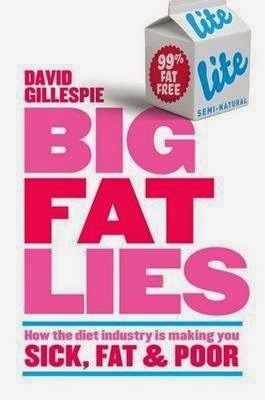 Big Fat Lies by David Gillespie
'Big Fat Lies - How the Diet Industry Makes You Sick, Fat and Poor'
is by an Australian lawyer, David Gillespie. He was fat, and he wanted to be thinner, but found, like so many of us, that diets don't work. So he started researching the subject.
Big Fat Lies by David Gillespie
'Big Fat Lies - How the Diet Industry Makes You Sick, Fat and Poor'
is by an Australian lawyer, David Gillespie. He was fat, and he wanted to be thinner, but found, like so many of us, that diets don't work. So he started researching the subject. As he says, he may not be a doctor or nutritionist, but what lawyers are really good at is following the evidence - which he presents in Big Fat Lies.
The tale that Gillespie uncovers about sugar and High-Fructose Corn Syrup is the same one told by Yudkin and Lustig in books previously reviewed here. Sugar is an addictive poison, which is stuffed into almost every manufactured food item because Big Food knows that it's hard for us to resist its addictive sweetness. So they sell more, and we end up with 'an obesity epedemic.'
Also, sugar is a cheap preservative, and helps to make it possible for packaged food to sit in warehouses and on shelves for months, even years, without decaying. (And food should decay - if it doesn't, then the colonies of bacteria who live in our guts, and do the work of digesting for us, can't do anything beneficial with it.)
 Be afraid, be very afraid But Gillespie doesn't simply repeat what Yudkin and Lustig have told us. He discovers additional nuggets.
Be afraid, be very afraid But Gillespie doesn't simply repeat what Yudkin and Lustig have told us. He discovers additional nuggets.Chromium, for instance. We need tiny amounts of the stuff to be healthy, and it's virtually impossible to be deficient in it (though that doesn't stop the food & diet industry from selling it to us in 'supplements' which don't work, and may even do harm.)
However, if your diet is high in sugar and/or high-fructose corn syrup - if, say, you drink a lot of soft drinks, or ready meals, or takeaways with sugary sauces - then the sugar very efficiently carries the chromium out of your body, resulting in the theoretically impossible chromium-deficiency.
And what is the effect of chromium-deficiency? Oh, have a guess - go on, guess. Chromium-deficiency makes us resistant to insulin, that's what. Which means high blood-sugar and diabetes 2.
It also means high insulin levels, as the body floods the blood-stream with insulin in an attempt to reduce blood-sugar. And how does insulin reduce - or attempt to reduce - blood-sugar levels?
By turning the excess sugar into fat. and tidying it away into fat cells.
So you're constantly hungry, constantly craving more sugar, and your weight gain is accelerated. A state of affairs that the processed food and diet industries are very happy about. A cynical person might suspect that, if they didn't exactly set out to create that state, they're very happy to perpetuate it.
(Remember how the tobacco industry denied, for decades, that there was any link between smoking and cancer? And banged on about 'the freedom to smoke?' (And the freedom to acquire all the disease associated with it.) Then it turned out that Big Tobacco had known there was a link with cancer for decades, for almost all the time they'd been denying there was and insisting that 'the research was inconclusive.'
(What does the food industry say, when it's told that sugar is poisonous and addictive? Sounding very like the tobacco industry, it says that sugar is simply a food like any other, that there is no clear link to disease or weight gain 'as part of a calorie controlled diet' and consumers should have the freedom to choose. So stop worrying, shut up, and have another fizzy drink.
(When huge, multi-national industries start being ever so worried about your 'freedom', be afraid, be very afraid.)
There's another condition which has been increasing, besides diabetes, and that's thyroidism. Pollution's been blamed; radioactive fall-out has been blamed. But you know what? There's another possible cause, much closer to home. A high sugar/fructose diet blocks the absorption of iodine, which means thyroid problems. Fancy that.
Big Fat Lies book is not so much eye-opening as eye-popping - and one of its most eye-popping aspects is on just how little research and poor evidence the 'government' and 'medical' nutritional advice has been based on for the past thirty years and more.
 Good for us all along? For thirty years we've been told that saturated fat is bad for us, gives us strokes and heart attacks. We should avoid fat, and eat a lot of carbs to fill us up - potatoes and bread and rice and pasta. And if we have to have fat, it should be vegetable oil.
Good for us all along? For thirty years we've been told that saturated fat is bad for us, gives us strokes and heart attacks. We should avoid fat, and eat a lot of carbs to fill us up - potatoes and bread and rice and pasta. And if we have to have fat, it should be vegetable oil.It turns out that not only is this wrong - but it was always known to be wrong.
Ancel Keys was the man who designed the American army's field rations for WWII - that's why they're called 'K-rations,' the 'K' being short for 'Keys.' This seems to have given him a lot of influence at government level.
So when he published research demonstrating a link between high saturated fat consumption and heart-attacks, the American government listened. Keys' study, published in 1953, looked at the saturated fat consumption in 7 countries: Japan, UK, Italy, Wales, Australia, Canada and the US. His stats showed, with perfect correlation, that the higher the fat consumption in these countries, the higher the rate of deaths from heart disease. This research is what all the 'avoid the killer fry-up' advice has stemmed from.
And it was nonsense. Even at the time, Keys' contemporaries pointed out that if he'd used the figures for Israel, Austria, Switzerland, Germany, Netherlands, Finland and Norway instead, his graph would have 'proved' exactly the opposite: that the more saturated fat consumed, the fewer deaths from heart disease.
Combine the figures from these 14 countries, and there is no significant correlation at all. The figures prove nothing whatsoever - unless you cherry-pick those that show what you've already decided the result should be.
Nor is there any proven link between cholesterol in the blood and heart-disease - but statins, which disrupt the body's natural functioning in order to lower its cholesterol production, are the highest selling drug in the world.
I wonder if there's a connection between that and the continuing message that 'high cholesterol means a high risk of death from a heart-attack.' (It doesn't. There is no clear connection between cholesterol in the diet and heart-attacks, and no evidence at all that eating a diet low in saturated fat has any effect on cholesterol levels in the blood.)
Dr William Castelli, part of the long-running Framingham Study, said in 1992 that, in fact, Framingham was finding that those who ate the most saturated fat, weighed least and were most active.
 Gillespie uncovers evidence - and names the papers - to show that, in fact, the most dangerous fats are those we're constantly being urged to eat: the polyunsaturated seed oils, such as sunflower, rape and canola oil. They have been strongly linked to cancer - and may even be the cause of the increasing number of skin-cancers. Not sunlight and sunburn after all - since we've evolved, over thousands of years, to cope with sunlight. Rather, the cause seems to be the action of sunlight on the polyunsaturated (and therefore, chemically, highly reactive) fat stored just under our skin.
Gillespie uncovers evidence - and names the papers - to show that, in fact, the most dangerous fats are those we're constantly being urged to eat: the polyunsaturated seed oils, such as sunflower, rape and canola oil. They have been strongly linked to cancer - and may even be the cause of the increasing number of skin-cancers. Not sunlight and sunburn after all - since we've evolved, over thousands of years, to cope with sunlight. Rather, the cause seems to be the action of sunlight on the polyunsaturated (and therefore, chemically, highly reactive) fat stored just under our skin.If you're interested in your own or your family's health - or are just increasingly suspicious of the multi-nationals which control our food and sway our governments, this is a book worth reading.
It's also worth reading if you'd like to get back to this:

Lard is good for you!
Or, at least, not bad for you. You might also find this link interesting.
Published on August 22, 2014 16:05
August 15, 2014
A Conversation With Kate Stilitz
Kate Stilitz is the writer who adapted my book, The Wolf's Footprint, and turned it into a musical, as reported last week. She agreed to tell us something about herself for this blog.
 Sue Price: I could tell, talking to you that you really love your job. How did you come to be doing it?
Sue Price: I could tell, talking to you that you really love your job. How did you come to be doing it?
Kate Stilitz: It all began in Mexico where I spent a year teaching Kate StilitzEnglish in a primary school after finishing my A-levels. I had a guitar with me and played a bit and soon found myself getting involved in musical activities. It was a great way of engaging with the children, despite the language barrier. One thing led to another and before we knew it we had created a bi-lingual song cycle. I realised there and then how much I enjoyed working with children through music. After Mexico I came back to London and have been running children’s community theatre projects and school-based performance projects ever since. What really excites me about my job is having the opportunity to work both with the children participating in the projects, and with artists from other disciplines to create something new. In the past I have collaborated with visual artists, other musicians and actors, and for The Wolf’s Footprint I collaborated with a choreographer, Neil Paris.
Kate StilitzEnglish in a primary school after finishing my A-levels. I had a guitar with me and played a bit and soon found myself getting involved in musical activities. It was a great way of engaging with the children, despite the language barrier. One thing led to another and before we knew it we had created a bi-lingual song cycle. I realised there and then how much I enjoyed working with children through music. After Mexico I came back to London and have been running children’s community theatre projects and school-based performance projects ever since. What really excites me about my job is having the opportunity to work both with the children participating in the projects, and with artists from other disciplines to create something new. In the past I have collaborated with visual artists, other musicians and actors, and for The Wolf’s Footprint I collaborated with a choreographer, Neil Paris.
Sue: Have you written musical plays before? If so, tell us about them please.
 Kate: Over the last 15 years I have written and co-written many different musicals, song cycles and other pieces for performance. These range from a theatrical exploration of the life of Mandela and the role of music in the struggle against apartheid, a performance piece about the Solar system using music, spoken word, movement and illuminated lanterns, a song cycle called Riversong , co-written with Jilly Jarman, which tells the story of a river’s journey through poetry, song and percussion
Kate: Over the last 15 years I have written and co-written many different musicals, song cycles and other pieces for performance. These range from a theatrical exploration of the life of Mandela and the role of music in the struggle against apartheid, a performance piece about the Solar system using music, spoken word, movement and illuminated lanterns, a song cycle called Riversong , co-written with Jilly Jarman, which tells the story of a river’s journey through poetry, song and percussion
Folk tales and legends have proved a great source of inspiration for new musicals and have led to new productions of The Snow Queen, The Return of Theseus and Little Red Riding Hood. There was a strong sense of folk tale in The Wolf’s Footprint which was one of the things that attracted me to it.
Sue: What’s the process of writing a play like that? I’m not musical at all, so I find it hard to imagine. Do you start with the words or the music?
Kate: The works I’ve written have emerged in a variety of ways. In the case of The Wolf’ Footprint, the starting point was ‘The Song of the Peasants’. I had an image of the villagers out in the forest: night is drawing in, and there they are, desperately searching for plants to eat as they have done every day since the crops failed. I tried to imagine the sense of frustration and hopelessness that the villagers might be feeling, and the relentlessness of the work they are doing. With this in my mind, I started improvising on the piano and with my voice, searching for a clear mood that I felt captured the scene.
In the case of The Wolf’ Footprint, the starting point was ‘The Song of the Peasants’. I had an image of the villagers out in the forest: night is drawing in, and there they are, desperately searching for plants to eat as they have done every day since the crops failed. I tried to imagine the sense of frustration and hopelessness that the villagers might be feeling, and the relentlessness of the work they are doing. With this in my mind, I started improvising on the piano and with my voice, searching for a clear mood that I felt captured the scene.
Once I had the music, the words came quite quickly and the play had its start. It’s not always like that - sometimes the words will emerge first and I have to search for the melody and sometimes they come simultaneously as they did for ‘The Song of The Advisors’. This song came about in response to a section of the story involving the king and his guards, as they are described in the book, and a need to shift the play rhythmically. Neil and I bounced ideas around and in our interpretation the guards became sycophantic advisors or courtiers. Very quickly and playfully, we sketched out a melody and some words and in a matter of minutes that song was born. The words and music for that song seemed to feed each other and it provided the shape for the characters in the play and led to a great scene.
Sue: It was a very funny scene - and you could see that the children were having a ball with it. But I loved the whole play.Thanks for blogging!
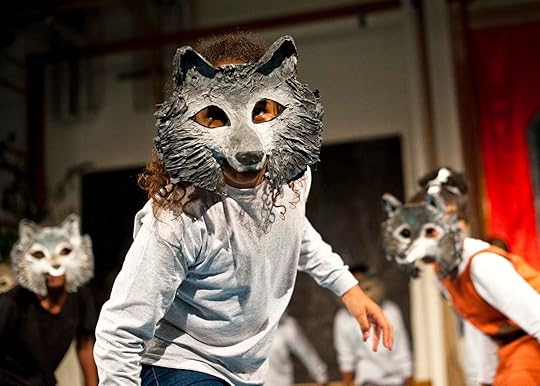 The Wolf's FootprintAdapted by Kate Stilitz and Neil Paris from the book, The Wolf's Footprint, by Susan Price (copyright 2003) by kind permission of, well, moi.Music and Lyrics: Kate StilitzDirected by Kate Stilitz and Neil ParisAssistant Director: C J CarrollSets/Props/Masks: Ramona BarsalonaCostumes: Caitriona McGarry and Miranda MaystonYear 6 Teachers: Charlotte Houchin and Isabel HamiltonAnd the children of Tiverton School
The Wolf's FootprintAdapted by Kate Stilitz and Neil Paris from the book, The Wolf's Footprint, by Susan Price (copyright 2003) by kind permission of, well, moi.Music and Lyrics: Kate StilitzDirected by Kate Stilitz and Neil ParisAssistant Director: C J CarrollSets/Props/Masks: Ramona BarsalonaCostumes: Caitriona McGarry and Miranda MaystonYear 6 Teachers: Charlotte Houchin and Isabel HamiltonAnd the children of Tiverton School
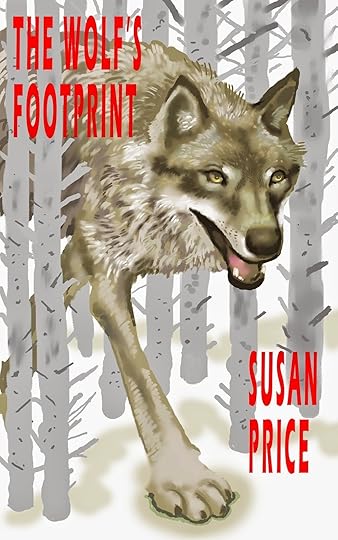
 Sue Price: I could tell, talking to you that you really love your job. How did you come to be doing it?
Sue Price: I could tell, talking to you that you really love your job. How did you come to be doing it? Kate Stilitz: It all began in Mexico where I spent a year teaching
 Kate StilitzEnglish in a primary school after finishing my A-levels. I had a guitar with me and played a bit and soon found myself getting involved in musical activities. It was a great way of engaging with the children, despite the language barrier. One thing led to another and before we knew it we had created a bi-lingual song cycle. I realised there and then how much I enjoyed working with children through music. After Mexico I came back to London and have been running children’s community theatre projects and school-based performance projects ever since. What really excites me about my job is having the opportunity to work both with the children participating in the projects, and with artists from other disciplines to create something new. In the past I have collaborated with visual artists, other musicians and actors, and for The Wolf’s Footprint I collaborated with a choreographer, Neil Paris.
Kate StilitzEnglish in a primary school after finishing my A-levels. I had a guitar with me and played a bit and soon found myself getting involved in musical activities. It was a great way of engaging with the children, despite the language barrier. One thing led to another and before we knew it we had created a bi-lingual song cycle. I realised there and then how much I enjoyed working with children through music. After Mexico I came back to London and have been running children’s community theatre projects and school-based performance projects ever since. What really excites me about my job is having the opportunity to work both with the children participating in the projects, and with artists from other disciplines to create something new. In the past I have collaborated with visual artists, other musicians and actors, and for The Wolf’s Footprint I collaborated with a choreographer, Neil Paris.Sue: Have you written musical plays before? If so, tell us about them please.
 Kate: Over the last 15 years I have written and co-written many different musicals, song cycles and other pieces for performance. These range from a theatrical exploration of the life of Mandela and the role of music in the struggle against apartheid, a performance piece about the Solar system using music, spoken word, movement and illuminated lanterns, a song cycle called Riversong , co-written with Jilly Jarman, which tells the story of a river’s journey through poetry, song and percussion
Kate: Over the last 15 years I have written and co-written many different musicals, song cycles and other pieces for performance. These range from a theatrical exploration of the life of Mandela and the role of music in the struggle against apartheid, a performance piece about the Solar system using music, spoken word, movement and illuminated lanterns, a song cycle called Riversong , co-written with Jilly Jarman, which tells the story of a river’s journey through poetry, song and percussion Folk tales and legends have proved a great source of inspiration for new musicals and have led to new productions of The Snow Queen, The Return of Theseus and Little Red Riding Hood. There was a strong sense of folk tale in The Wolf’s Footprint which was one of the things that attracted me to it.
Sue: What’s the process of writing a play like that? I’m not musical at all, so I find it hard to imagine. Do you start with the words or the music?
Kate: The works I’ve written have emerged in a variety of ways.
 In the case of The Wolf’ Footprint, the starting point was ‘The Song of the Peasants’. I had an image of the villagers out in the forest: night is drawing in, and there they are, desperately searching for plants to eat as they have done every day since the crops failed. I tried to imagine the sense of frustration and hopelessness that the villagers might be feeling, and the relentlessness of the work they are doing. With this in my mind, I started improvising on the piano and with my voice, searching for a clear mood that I felt captured the scene.
In the case of The Wolf’ Footprint, the starting point was ‘The Song of the Peasants’. I had an image of the villagers out in the forest: night is drawing in, and there they are, desperately searching for plants to eat as they have done every day since the crops failed. I tried to imagine the sense of frustration and hopelessness that the villagers might be feeling, and the relentlessness of the work they are doing. With this in my mind, I started improvising on the piano and with my voice, searching for a clear mood that I felt captured the scene.Once I had the music, the words came quite quickly and the play had its start. It’s not always like that - sometimes the words will emerge first and I have to search for the melody and sometimes they come simultaneously as they did for ‘The Song of The Advisors’. This song came about in response to a section of the story involving the king and his guards, as they are described in the book, and a need to shift the play rhythmically. Neil and I bounced ideas around and in our interpretation the guards became sycophantic advisors or courtiers. Very quickly and playfully, we sketched out a melody and some words and in a matter of minutes that song was born. The words and music for that song seemed to feed each other and it provided the shape for the characters in the play and led to a great scene.
Sue: It was a very funny scene - and you could see that the children were having a ball with it. But I loved the whole play.Thanks for blogging!
 The Wolf's FootprintAdapted by Kate Stilitz and Neil Paris from the book, The Wolf's Footprint, by Susan Price (copyright 2003) by kind permission of, well, moi.Music and Lyrics: Kate StilitzDirected by Kate Stilitz and Neil ParisAssistant Director: C J CarrollSets/Props/Masks: Ramona BarsalonaCostumes: Caitriona McGarry and Miranda MaystonYear 6 Teachers: Charlotte Houchin and Isabel HamiltonAnd the children of Tiverton School
The Wolf's FootprintAdapted by Kate Stilitz and Neil Paris from the book, The Wolf's Footprint, by Susan Price (copyright 2003) by kind permission of, well, moi.Music and Lyrics: Kate StilitzDirected by Kate Stilitz and Neil ParisAssistant Director: C J CarrollSets/Props/Masks: Ramona BarsalonaCostumes: Caitriona McGarry and Miranda MaystonYear 6 Teachers: Charlotte Houchin and Isabel HamiltonAnd the children of Tiverton School
Published on August 15, 2014 16:00
August 8, 2014
Orchestra! Lights! Cue the Wolf Pack!'
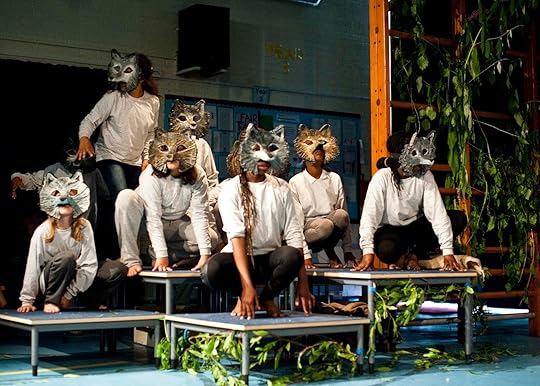 The wolf pack
The wolf packChildren twisting and bending like trees in the wind, their arms forming low-hanging branches, a living forest to be lost in.
Other children, wearing wolf-masks, climb through a leafy terrac, and slink and prowl.
A peasant's chorus sing, beautifully, about the turning of the seasons, and the hunger that comes with winter.
A troop of pompous, self-satisfied courtiers strut and cluck.
And all the children quite obviously having a wonderful time as they sing and dance and act out their part.
As their headmistress, Resham Mirza said, it was wonderful to see their courage and freedom on the stage.
I saw all this at Tiverton School last week - a wonderful primary school in Tottenham.
 Kate Stilitz
Kate StilitzI was there because I was contacted, through my website, by Kate Stilitz, Tiverton's music teacher. She had come across my book, The Wolf's Footprint, had loved it, and had turned it into a play, writing the script, songs and music herself. She wondered if I would like to come and see it performed?
Well, what a silly question. It is true that I detest traveling to London. I don't like London much. It always seems to be roasting hot when I'm there, and gritty and dirty, noisy and crowded - normally I'd much, much rather spend 15 hours traveling to the Outer Hebrides than two hours traveling to London.
But how many chances do you get to see a story that you wrote interpreted and reinvented by another artist because they loved it? With all the work, and thought, and revision that entails?
Not many... So there was never any question but that I would go.
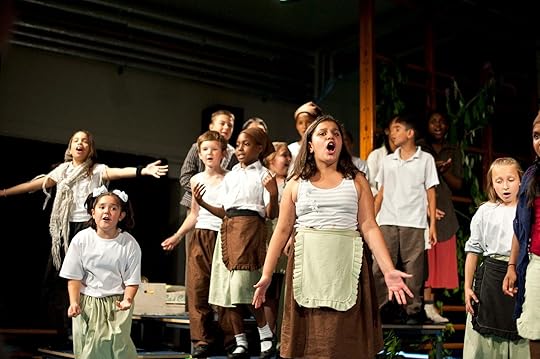 The villagers sing a rousing chorus It was a roasting hot day. London was as noisy, crowded, dirty and gritty as ever. But the play, and the children's performance - was worth it and more. There wasn't a moment when my attention wandered - I sat there throughout with a big grin on my face. You might say I was biased - but the rest of the audience, made up of parents and children from other classes in the school, were equally absorbed, despite the heat.
The villagers sing a rousing chorus It was a roasting hot day. London was as noisy, crowded, dirty and gritty as ever. But the play, and the children's performance - was worth it and more. There wasn't a moment when my attention wandered - I sat there throughout with a big grin on my face. You might say I was biased - but the rest of the audience, made up of parents and children from other classes in the school, were equally absorbed, despite the heat.Called on to say a few words after, I said that, although a bit late - my birthday had been the week before - it was the best birthday present I'd ever had.
I mentioned that I'd written a book called The Ghost Drum, which had been awarded the Carnegie Medal for best book of its year - and that this was better. And I mean it.
I'm not decrying the Carnegie Medal in any way. It was awarded by librarians who work with children, and who are informed, and often passionate, about children's books and their importance. And they gave me their medal. I'm proud of that.
But it doesn't quite compare with discovering that another artist has so enjoyed and 'got' something that you've written, that they've been willing to pour their own energy into creating something new from it.
Thank you, Kate. And thank you, the wonderful cast.
The wolf-masks were made by Ramona Barsalona,
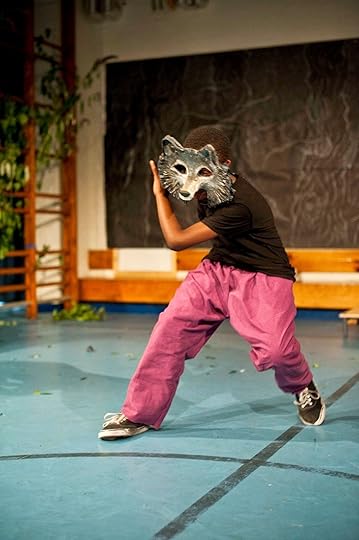 Daw becomes a wolf. Thank you to Kate for the photos - which will find their way to my website eventually.
Daw becomes a wolf. Thank you to Kate for the photos - which will find their way to my website eventually.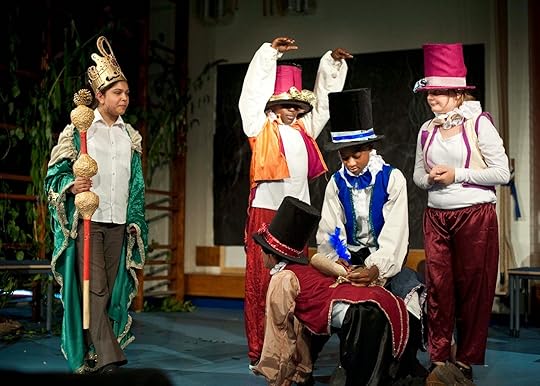 The King and his court.
The King and his court.The book of the musical is available as an e-reader from:AmazonBarnes & Noble (Nook) Kobo iBook
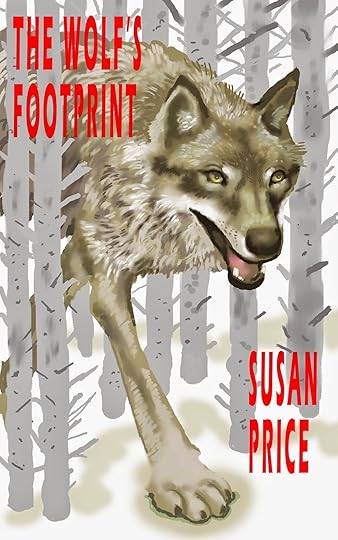 It's available from Amazon as a paperbackwith black and white illustrationswith colour illustrations
It's available from Amazon as a paperbackwith black and white illustrationswith colour illustrations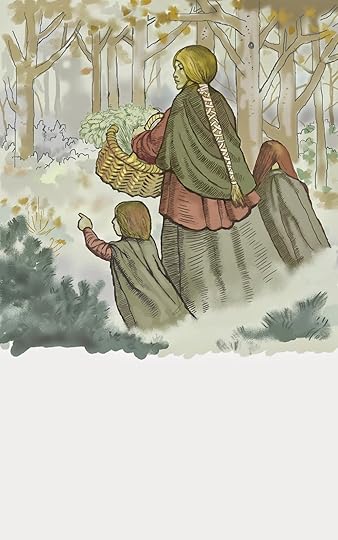
Published on August 08, 2014 16:05
August 1, 2014
Game of Seven: The Two Dogs
The 'Game of Seven' seems to be the latest craze among
 literary bloggers, and it's quite fun.
literary bloggers, and it's quite fun.
The idea is that you take your work in progress, go to the seventh page, count seven lines down, and then quote the next seven lines (more or less.)
So here goes:-
This isn't exactly a work-in-progress. It's more a work-with-agent.
The narrator is Sandy and, at the age of 10, he had just been bonded, by his mother, to work for the Thomsons until he is twenty-one.
The book tells the story of his mistreatment, and how he runs away to home. His mother orders him back to the farm. She doesn't have the money to repay his bond.
But the bad treatment grows worse, so Sandy runs away. He is breaking his bond, and has also taken carrots and oats from the stable, so he has stolen food too. He knows that he could be hung for theft, if caught.
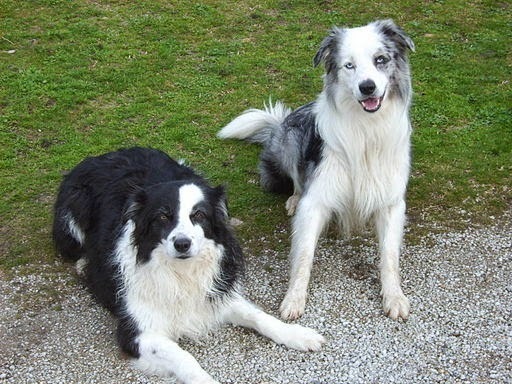 Wikimedia Commons: Jean-Louis Petermann He falls in with two drove dogs, who provide protection and company. They are making their way home, alone, after the end of a drove. Sandy, with nowhere else to go, decides to follow the dogs to wherever they're going. Together with the dogs, he walks across Scotland to its West coast - and then follows the dogs further, to the Hebrides.
Wikimedia Commons: Jean-Louis Petermann He falls in with two drove dogs, who provide protection and company. They are making their way home, alone, after the end of a drove. Sandy, with nowhere else to go, decides to follow the dogs to wherever they're going. Together with the dogs, he walks across Scotland to its West coast - and then follows the dogs further, to the Hebrides.
Secretly he hopes that the dogs will lead him to a new home, even though he mistrusts everyone.
A few publishers have already seen it and rejected it. The consensus seems to be that the story is too slow, and too old-fashioned. The fact that it's being told by a man to his children, makes it less exciting.
They're right - and publishing is a business, and there's no reason why they should publish something they don't think will sell and make them a profit. But I had to write the story as I felt it should be.
As I worked on it, I considered, and rejected, ways to make the story more exciting. I could have had the boy hotly pursued by the authorities, or vengefully pursued by the farmer - but I didn't feel that either would be realistic, or historically accurate.
At the time the story is set - roughly 1800 - there was no official police force. To have the boy hunted and arrested, the authorities in each district would have to have been contacted, with a description, by letter. They would then have had to consider it worth the time and effort to search for, and arrest, a ten year old boy. Even if this had been done, I couldn't imagine the hunt being pursued with enough vigour to make the story exciting.
To lead the hunt himself, the farmer would have had to leave the work of his farm - even though he has little idea of where the boy has gone - and ride for miles, asking for him. I thought it more likely that the farmer would go to the boy's home and, if he didn't find him there, would make a few local enquiries, and then give up. (The farmer does reappear, vengefully, towards the end of the book.)
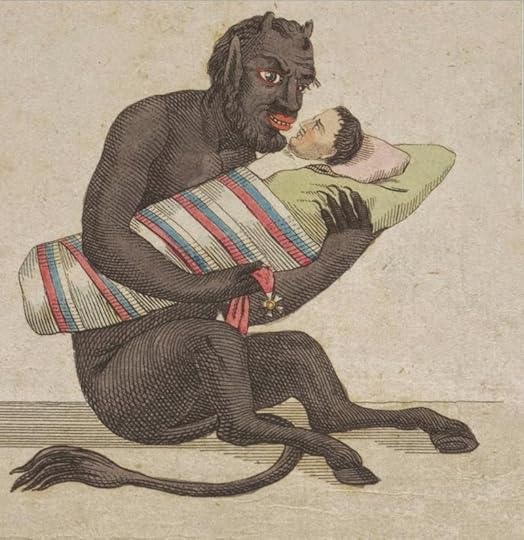 Not a keeper... For me, the story is not about a chase, and whether or not the boy will be caught. It's about resilience. It's also about getting up and walking away from a bad situation - about having to courage to gamble that the devil you don't know may be better than the devil you do. (I've never been convinced by the view that just because a devil is familiar, you should stick by him. Go and find another.)
Not a keeper... For me, the story is not about a chase, and whether or not the boy will be caught. It's about resilience. It's also about getting up and walking away from a bad situation - about having to courage to gamble that the devil you don't know may be better than the devil you do. (I've never been convinced by the view that just because a devil is familiar, you should stick by him. Go and find another.)
It's about the young hero coming to the realisation that just because these people have treated him badly, it doesn't mean that all people will always do so (which is a notion that traps many adults in misery, so a lesson worth learning early, I think.)
Here, the boy is trudging through the hills above Oban, when he hears the hoofbeats of ponies coming up behind him.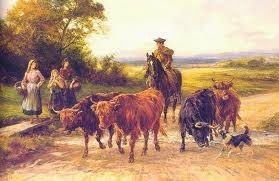 'The Handsome Drover' by Heywood Hardy
'The Handsome Drover' by Heywood Hardy
 literary bloggers, and it's quite fun.
literary bloggers, and it's quite fun.The idea is that you take your work in progress, go to the seventh page, count seven lines down, and then quote the next seven lines (more or less.)
So here goes:-
“You stay there,” Mrs. Thomson said, “until my husband gets home. He’ll know what to do with you.” Mind that she did not ask me into the kitchen. I was to stand in the yard until her husband came home, and he would know what to do with me – as if I was some new tool. I was to stand outside and eat in the yard, like the rest of the farm’s livestock. I was not good enough to step into the kitchen. That was the start of the worst time of my life. I had hard times in later years: hard living and hard work. But there has never yet been a time worse than that.
This isn't exactly a work-in-progress. It's more a work-with-agent.
The narrator is Sandy and, at the age of 10, he had just been bonded, by his mother, to work for the Thomsons until he is twenty-one.
The book tells the story of his mistreatment, and how he runs away to home. His mother orders him back to the farm. She doesn't have the money to repay his bond.
But the bad treatment grows worse, so Sandy runs away. He is breaking his bond, and has also taken carrots and oats from the stable, so he has stolen food too. He knows that he could be hung for theft, if caught.
 Wikimedia Commons: Jean-Louis Petermann He falls in with two drove dogs, who provide protection and company. They are making their way home, alone, after the end of a drove. Sandy, with nowhere else to go, decides to follow the dogs to wherever they're going. Together with the dogs, he walks across Scotland to its West coast - and then follows the dogs further, to the Hebrides.
Wikimedia Commons: Jean-Louis Petermann He falls in with two drove dogs, who provide protection and company. They are making their way home, alone, after the end of a drove. Sandy, with nowhere else to go, decides to follow the dogs to wherever they're going. Together with the dogs, he walks across Scotland to its West coast - and then follows the dogs further, to the Hebrides. Secretly he hopes that the dogs will lead him to a new home, even though he mistrusts everyone.
A few publishers have already seen it and rejected it. The consensus seems to be that the story is too slow, and too old-fashioned. The fact that it's being told by a man to his children, makes it less exciting.
They're right - and publishing is a business, and there's no reason why they should publish something they don't think will sell and make them a profit. But I had to write the story as I felt it should be.
As I worked on it, I considered, and rejected, ways to make the story more exciting. I could have had the boy hotly pursued by the authorities, or vengefully pursued by the farmer - but I didn't feel that either would be realistic, or historically accurate.
At the time the story is set - roughly 1800 - there was no official police force. To have the boy hunted and arrested, the authorities in each district would have to have been contacted, with a description, by letter. They would then have had to consider it worth the time and effort to search for, and arrest, a ten year old boy. Even if this had been done, I couldn't imagine the hunt being pursued with enough vigour to make the story exciting.
To lead the hunt himself, the farmer would have had to leave the work of his farm - even though he has little idea of where the boy has gone - and ride for miles, asking for him. I thought it more likely that the farmer would go to the boy's home and, if he didn't find him there, would make a few local enquiries, and then give up. (The farmer does reappear, vengefully, towards the end of the book.)
 Not a keeper... For me, the story is not about a chase, and whether or not the boy will be caught. It's about resilience. It's also about getting up and walking away from a bad situation - about having to courage to gamble that the devil you don't know may be better than the devil you do. (I've never been convinced by the view that just because a devil is familiar, you should stick by him. Go and find another.)
Not a keeper... For me, the story is not about a chase, and whether or not the boy will be caught. It's about resilience. It's also about getting up and walking away from a bad situation - about having to courage to gamble that the devil you don't know may be better than the devil you do. (I've never been convinced by the view that just because a devil is familiar, you should stick by him. Go and find another.)It's about the young hero coming to the realisation that just because these people have treated him badly, it doesn't mean that all people will always do so (which is a notion that traps many adults in misery, so a lesson worth learning early, I think.)
Here, the boy is trudging through the hills above Oban, when he hears the hoofbeats of ponies coming up behind him.
 'The Handsome Drover' by Heywood Hardy
'The Handsome Drover' by Heywood HardyI glanced back and saw a couple of men coming along on two tough little ponies. By their clothes, I thought them drovers, on their way home from market... Not so long before, I would have run from the path and hidden from those men, but now I was bolder. I turned back to my road, taking no notice of the riders. I thought they would go by, taking no more notice of me than I took of them. Instead they came up beside me, and slowed. The nearest rider spoke to me, in Gaelic. It meant no more to me than the bird twitter all around. I looked up and saw a man looking down at me from the pony’s back. He wore a thick tweed coat, and a tweed cap pulled down low, and a bright red scarf wrapped around his neck.. all sparkling with drops of rain caught on the wool. His beard and moustache were thick and curly, both grey and dark, so I couldn’t see much of his face, except for his blue eyes and big yellowish teeth. I looked away and carried on walking. I thought he would think me dumb or stupid. I thought he would soon be tired of yapping at me in Gaelic, and would kick up his pony and ride on. Instead, after waiting a while for an answer, he said, in English, “The laddie with the doggies!" I looked up in surprise then. He laughed, and coughed, with deep, rumbling sounds. "Aha!" he said. "English! Everywhere we hear tell of the laddie with the doggies." I wanted to run away and hide then. I felt caught out, and trapped. But we were in a steep-sided gulley and they were on horses. I wouldn’t be able to run far before they caught me. "Don't you run, don't run!" said the man with the red scarf. "Look at doggies!" I did. Spot and Patch were trotting alongside me, but they were looking up at the men on the horses. Their tongues hung out over their teeth, and their tails wagged. “The doggies ken us well,” said Red Scarf. “We ken the man of them." The other man had a pipe in his mouth. He laughed around it, and it wagged as he said, “That we do!” “You know their owner?” I said. Red Scarf laughed. "You can talk, so you can! Aye, IMy agent says there are a few publishers to see the book yet, before we give up. But it's quite possible that I shall be publishing it myself.'Waiting for Master' - by Edward Robert Smytheken their owner. He’s cried Lachlan Maclean... What might you be cried, laddie?” “None of your business,” I said. "A strange name for a laddie," Red Scarf said. “Hector, have ever you heard of a laddie called ‘None Of Your Business’ before now?” The man with the pipe laughed, and I scowled at them both, my shoulders hunched up and my bottom lip stuck out. Red Scarf’s pony still plodded beside me. "Is it that Lachlan’s doggies have looked after you well, None Of Your Business?” Oh, how I hated him. "I have no stolen them!" I said. Those dogs were worth far more than the oats and carrots and sacks I had stolen. I would have been hung three times over for stealing them. "No, no, indeed," he said. "We never thought you had stolen them. We were wondering if, maybe, the doggies had stolen you?" His pipe-smoking friend laughed again. I could think of nothing to say, but trudged on in silence, refusing to look at them. If I ignored them, I thought, they would be bored and would ride past. But they let their horses slow to a dawdle. I looked up and was startled to find Red Scarf watching me. His eyes were very blue among his brown wrinkles. "You must leave them thieving doggies," Red Scarf said. "They will lead you into bad ways." He drew up his horse. I saw that another track joined ours just at that place. It led away downhill. “We go this way, None Of Your Business,” Red Scarf said. “We are going to pay a visit to my sister who married a man from here. Leave them bad, thieving doggies to tend their own business and come along with us. My sister will stuff you like a goose for Christmas."
That was a wonderful, tempting thought. Food and plenty of it – and a warm, dry place to sleep. I hesitated, I admit. But no doubt this man’s sister would be glad of a boy she could set to work, and feed on scraps, and belt for no reason at all. "Come on lad!" Red Scarf said, and Pipe-Smoker laughed again. I looked at Spot and Patch. They were trotting away down the main track. They were clever — they knew which way I should be going. Spot looked over his shoulder at me... I turned my back on the riders and walked after the dogs. "Lad!" Red Scarf called after me. I turned and walked backwards, so I could keep an eye on him, and run away if he came after me. "Lad." He made his pony walk towards me. “One night in a house will no hurt." Spot and Patch came trotting back to me. They sat down beside me, but Spot looked from me to the main track, making it very clear that he wanted to be getting on. "Clear off,” I said to Red Scarf. I told you, in those days, I was a hard little nut. I hadn’t any manners. Red Scarf nodded to himself and felt in the pocket at his belt. He took out a coin and offered it to me, leaning down from his saddle. “I don’t want your money,” I said. I knew that people always want something in return when they give you money... "I was not giving the money to you," he said. "It's for the doggies." He threw the coin and it landed on the hard trodden earth of the track. Both dogs trotted over and sniffed at it, as if they really thought it was meant for them. "Be so kind as to look after it for them,” Red Scarf said. “God go with you. I will look for you in — " He said something that I didn’t understand — but I didn’t think I would ever see him again, so it didn’t matter.
Anyone interested in the old droving trade, or in Border Collies, might enjoy this site - The Border Collie Museum'The Shepherd's dog' by Howitt
Published on August 01, 2014 16:05
Susan Price's Nennius Blog
"I have made a little heap of all I've found..."
"I have made a little heap of all I've found..."
...more
- Susan Price's profile
- 71 followers


